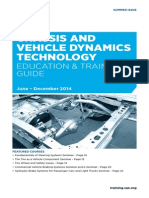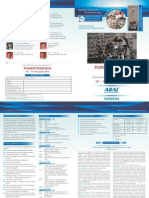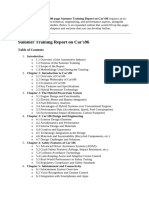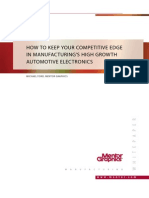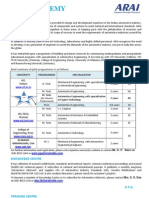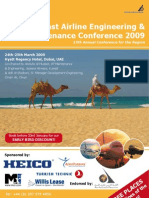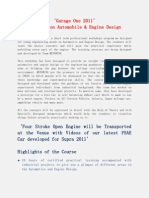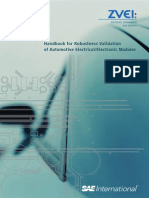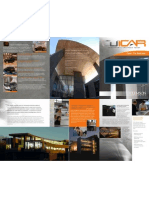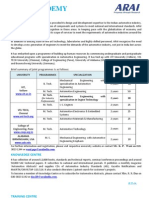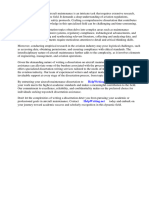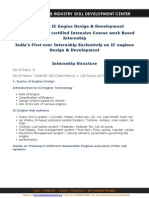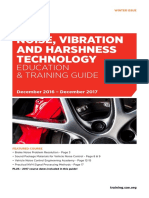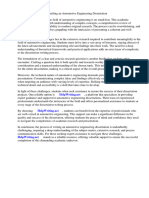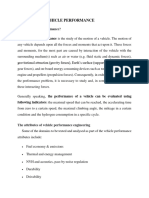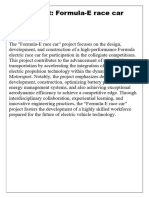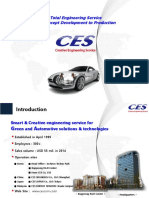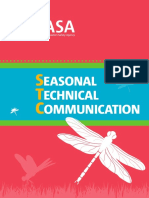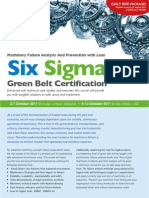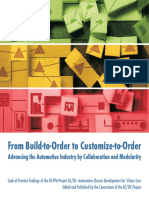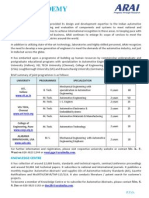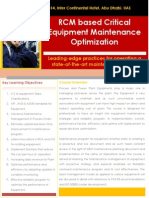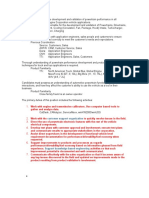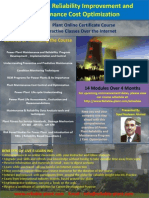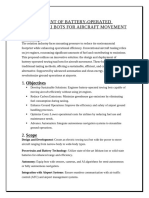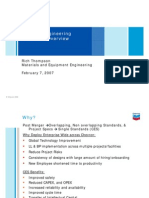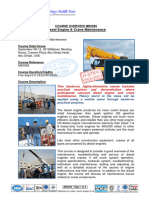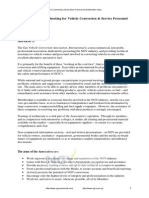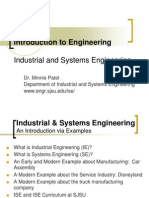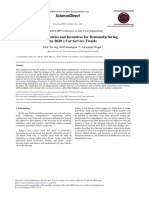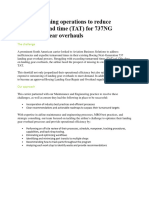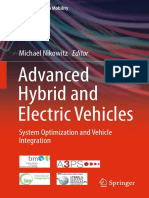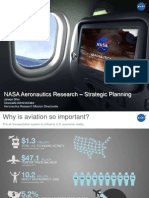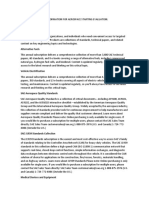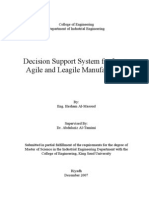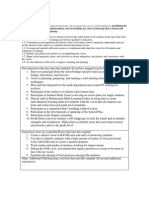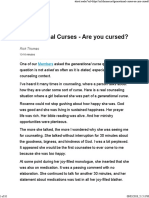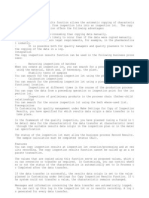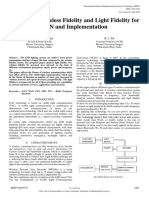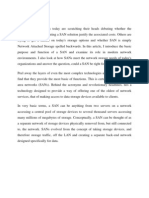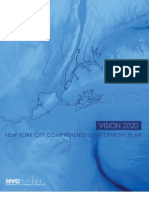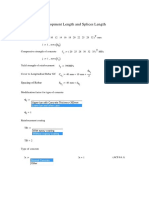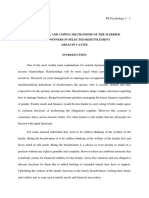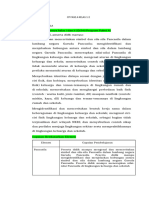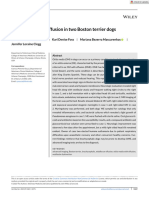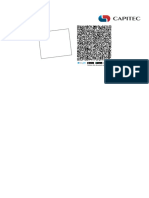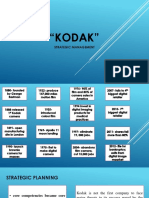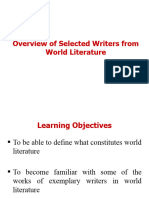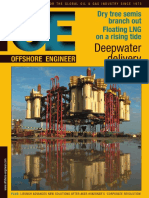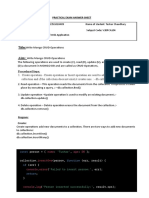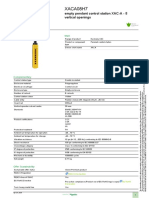0 ratings0% found this document useful (0 votes)
127 viewsCatalog
Catalog
Uploaded by
Bahram Auto-EngCopyright:
Attribution Non-Commercial (BY-NC)
Available Formats
Download as PDF, TXT or read online from Scribd
Catalog
Catalog
Uploaded by
Bahram Auto-Eng0 ratings0% found this document useful (0 votes)
127 views36 pagesCopyright
© Attribution Non-Commercial (BY-NC)
Available Formats
PDF, TXT or read online from Scribd
Share this document
Did you find this document useful?
Is this content inappropriate?
Copyright:
Attribution Non-Commercial (BY-NC)
Available Formats
Download as PDF, TXT or read online from Scribd
Download as pdf or txt
0 ratings0% found this document useful (0 votes)
127 views36 pagesCatalog
Catalog
Uploaded by
Bahram Auto-EngCopyright:
Attribution Non-Commercial (BY-NC)
Available Formats
Download as PDF, TXT or read online from Scribd
Download as pdf or txt
You are on page 1of 36
Schedule of
Seminars and Webinars
May December 2010
Automotive Aerospace Commercial Vehicle
Technical areas include:
Aerospace
Electronics (Communications and Controls)
Design Processes/Quality & Reliability
Engines & Propulsion
Environment/Emissions
Fuels/Lubricants
Management
Materials/Chemicals
Noise/Vibration/Harshness (NVH)
Safety
Systems & Components
Tests & Testing
Vehicle Dynamics & Handling
See inside for seminar
overviews, dates & locations
Convenient Locations!
Seminars held in
Michigan,
Illinois,
Kansas
& more!
SAE seminars receive the IACET CEU.
For more information, visit www.sae.org/iacet
To register call or visit
Online: www.sae.org/events/training
P100457
AErospACE ............................. 1-4
Human Factors in Flight Decks: Design and
Certifcation
Aerospace Product Support: Sustainment Throughout
the Life Cycle
Aircraft Cabin Safety and Interior Crashworthiness
Failure Modes and Effects Analysis (Product &
Process) in Aerospace
Aerospace Coatings and Corrosion Control:
Materials and Applications
Introduction to AS5553 and Counterfeit Electronic
Parts Avoidance Training
Understanding AS9100 Rev C Webinar
Understanding the FAA Aircraft Certifcation Process
Accelerated Test Methods for Ground and Aerospace
Vehicle Development
Digital Avionics Fiber Optics Technology and
Standards for Aerospace
Reverse Engineering: Technology of Reinvention
Understanding AS9100C Quality Management
System Standard
ELECTroNICs (CoMMUNICATIoNs
& CoNTroLs) ...................... 5-6
Acquiring and Analyzing Data from Sensors and In-
Vehicle Networks
Controller Area Network (CAN) for Vehicle
Applications
Control Systems Simplifed
Embedded Control Systems Design Workshop
Emissions-Related OBD Systems: A Design
Overview
Fundamentals of Shielding Design for EMC
Compliance
In-Vehicle Networking with LIN and FlexRay
Applications
Design Processes/QualiTy &
reliabiliTy ...........................7-9
Design for Manufacturing & Assembly (DFM/DFA)
Design Reviews for Effective Product Development
Finite Element Analysis for Design Engineers -
Hands-on FEA Workshop
Geometric Dimensioning & Tolerancing
Introduction to Failure Modes & Effects Analysis for
Product Design & Manufacturing Process Design
(Product & Process FMEA)
Statistical Tolerance Design
Tolerance Stack-Up Analysis
Tolerance Stack-up Fundamentals Webinar
Design of Experiments (DOE) for Engineers
Weibull-Log Normal Analysis Workshop
ENGINEs & propULsIoN ..... 10-14
Automotive Fuel Cell Systems
Combustion and Emissions for Engineers
Common Rail Diesel Fuel Injection
Diesel Emissions and Control Technologies
Diesel Engine Technology
Diesel Engine Technology Engineering Academy
Fundamentals of Hybrid Electric Vehicles
Introduction to Hydraulic Hybrid Systems for Road
Vehicles
Piston Ring Design/Materials
Powertrain Selection for Fuel Economy and
Acceleration Performance
The Basics of Internal Combustion Engines
Basic Hybrid and Electric Vehicle Safety Webinar
Hybrid and Electric Vehicles: Current
Production, Future Strategies Webinar
Introduction to Hybrid Powertrains Webinar
Plug-in Hybrids: Opportunities and
Challenges Webinar
Principles of Electric Drives Webinar
Turbocharging for Fuel Economy and
Emissions Webinar
Turbocharging Internal Combustion Engines
ENVIroNMENT ...................... 15-16
Advanced Diesel Particulate Filtration Systems
Selective Catalytic Reduction for Diesel Engines
Catalytic Converters: Design and Durability
Evaporative and Refueling Emission Control
Exhaust Flow Performance and Pressure Drop of
Exhaust Components and Systems
FUELs/LUBrICANTs ............. 16-17
Alternative Fuels: Impact on SI and CI Fuel Systems,
Distribution and Storage
Fundamentals of Automotive Fuel Delivery Systems
Motor Fuel: Technology, Performance, Testing, and
Specifcations
Modern Fluids for Crankcase Engines: An Overview
Improving Fuel Effciency with Engine Oils
MANAGEMENT ....................... 17-19
Engineering Project Management
Leading High Performance Teams
Managing Engineering & Technical Professionals
Principles of Cost and Finance for Engineers
Strategic Leadership
Patent Litigation in the U.S.: What You
Need to Know Webinar
Patent Law for Engineers
MATErIALs/CHEMICALs ..... 19-20
Adhesive Bonding Technology
Advanced High Strength Steels for Vehicle Weight
Reduction
Fundamentals of Metal Fatigue Analysis
Automotive Glazing Materials
Metal Corrosion and Its Prevention
NoIsE/VIBrATIoN/HArsHNEss
(NVH) ...................................... 21
Vibration Analysis using FEA: A Hands-on
Workshop
Basic Noise Control
Sound Package Materials for Vehicle Noise Control
Practical NVH Signal Processing Methods
sAFETY ................................22-23
Side Impact Occupant Safety and CAE
Vehicle Frontal Crash Occupant Safety and CAE
Vehicle Accident Reconstruction Methods
Injuries, Anatomy, Biomechanics & Federal
Regulation
sYsTEMs & CoMpoNENTs ..23-28
Safe Handling of High Voltage Battery Systems New
Introduction to Hybrid and Electric Vehicle Battery
Systems
A Familiarization of Drivetrain Components
Brake Friction Materials: Testing, Quality and
Selection
Automotive Powertrain and Battery Cooling Airfow
Systems: A Vehicle Perspective
Brake Noise Problem Resolution
Brake NVH, Measurement, and Testing
Commercial Vehicle Braking Systems
Compact Heat Exchangers for Automotive
Applications
Dual-Clutch Transmission Technology Applied to
Automotive Powertrain Webinar
Fundamentals of Automotive All-Wheel Drive
Systems
Fundamentals of Continuously Variable
Transmission Technology Webinar
Fundamentals of Modern Vehicle Transmissions
Fundamentals of Steering Systems
Hydraulic Brake Systems for Passenger Cars and
Light Trucks
Introduction to Commercial and Off-Road Vehicle
Cooling Airfow Systems
Introduction to Gears
Powertrain Control Unit/Transmission Control
Unit Technology Webinar
Review of Automated Manual Transmission
Technology Webinar
Static and Dynamic Sealing
The Tire as a Vehicle Component
Threaded Fasteners and the Bolted Joint
Tire and Wheel Safety Issues
Wet Brake & Clutch Technology
Introduction to Brake Control Systems:
ABS, TCS, and ESC
TEsTs & TEsTING ...................... 29
Accelerated Test Methods for Ground and Aerospace
Vehicle Development
VEHICLE DYNAMICs &
HANDLING .......................29-30
Chassis & Suspension Component Design for
Passenger Cars & Light Trucks
Advanced Vehicle Dynamics for Passenger Cars
and Light Trucks
Applied Vehicle Dynamics
Fundamentals of Heavy Truck Dynamics
Vehicle Dynamics for Passenger Cars and Light
Trucks
TABLE oF CoNTENTs
To register, go to: www.sae.org/events/training or call 1-877-606-7323 (U.S. & Canada) or 1-724-776-4970
Interested in having one of these seminars at
your company?
If so, please call SAEs Corporate Learning Solutions hotline
at 724-772-8529, or complete the online form at
www.sae.org/corplearning
1
To register, go to: www.sae.org/events/training or call 1-877-606-7323 (U.S. & Canada) or 1-724-776-4970
Webinars
Key
CertifiCate Program aCtar aPProVeD seminars
AerospAce
Human factors in flight Decks:
Design and Certification
May 24, 2010 -- Wichita, KS, USA
Check website for additional 2010 dates.
i.D.#C0952
Advances in technology continue to lead to progressively more complex
aircraft and flightdeck designs. The complexities of the modern day air-
craft must be balanced with the cognitive and physical capabilities and
limitations of the pilots that fly them. Aviation Human Factors is rec-
ognized as a discipline that addresses these challenges. This seminar is
designed for engineers and other aviation professionals seeking a funda-
mental understanding of human factors and ergonomics and how the
discipline applies to the design and certification of the flightdeck. FAA
and EASA regulations and guidance material will also be examined in
an effort to help participants understand the system integration chal-
lenges and how to incorporate human factors throughout the design
and certification processes.
Attendees will receive the text, Human Factors Methods: A Practical
Guide for Engineering and Design, written by Neville A. Stanton.
For complete details visit: www.sae.org/pdevent/C0952
Instructor: Cindy Miller
Fee $795; SAE Mbrs. $705 .7 CEUs
aerospace Product support:
sustainment throughout the
Life Cycle
September 27-28, 2010 -- Wichita, KS, USA
i.D.#C0945
In todays aerospace industry, product life-cycles are often being
extended far beyond a products original design expectations. With
fewer and fewer new aerospace products being introduced into the
marketplace, there is a dramatic need for increased emphasis on sup-
porting these products in the most efficient and effective manner
possible throughout the entire product life-cycle. In addition to the
initial product acquisition cost, customers are becoming more aware
and sensitive to the products total life-cycle cost. The long-term costs
to operate, maintain, and otherwise sustain these products are often
a determining factor in the initial product acquisition. This two day
seminar is intended to introduce participants to the various approach-
es, technologies, and tools available to support a product throughout
the products total life-cycle in the most efficient manner possible.
Major topics presented and discussed during this seminar include The
Elements of Logistics, Performance Based Logistics, Product Support
Integration, and regulatory requirements. Collectively, the information
presented in this seminar will equip attendees with the skills and tech-
niques needed to help them comfortably and confidently develop the
best tailored support package, satisfying the needs of both the customer
and the provider.
For complete details visit: www.sae.org/pdevent/C0945
Instructor: Drex Rutledge
Fee $1,155; SAE Mbrs. $1,035 1.3 CEUs
aircraft Cabin safety and interior
Crashworthiness
August 3-4, 2010 -- Warrendale, PA, USA
i.D.#C0926
The certification of transport category cabin interiors requires a thor-
ough understanding of Part 25 Transport Category aircraft cabin
interior safety and crashworthiness regulations and compliance require-
ments. Regardless of whether it is a simple modification, a specialized
completion (VIP or VVIP) or airline passenger configuration, engineers,
designers, and airworthiness personnel must understand and adhere to
these requirements. This two day seminar will begin with a discussion
of Commercial off the Shelf (COTS) test requirements. The instruc-
tor will then guide participants through the various cabin interior
emergency provisions and their requirements such as supplemental pas-
senger oxygen, emergency equipment, seats, flammability, emergency
exits, emergency lighting and escape path markings, and various other
cabin interior systems. Additionally, DO-160 environmental, cooling
and ventilation requirements will be discussed to provide participants a
comprehensive introduction to cabin interior safety and crashworthiness
requirements as specified in the CFR Part 25 Airworthiness Standards.
For complete details visit: www.sae.org/pdevent/C0926
Instructor: Ken Farsi
Fee $1,155; SAE Mbrs. $1,040 1.3 CEUs
Regi stRati on i nfoRmati on
If you have a disability that may impact your participation
in this seminar, please call 2 weeks prior to the start date so
that we can address your needs.
Condition of Sale: If you cannot attend, you may send a substitute or
transfer to a future offering. The member discount may be adjusted based
on the substitutes SAE membership level. A full refund is issued if you
notify SAE at least 14 days prior to seminar start date. If canceled less
than 14 days prior, the full fee is charged. For $50, you may process a
one-time transfer to a future offering within one year of canceled seminar.
Canceling may reduce group discounts. To cancel, transfer or send a
substitute, call SAE Customer Service at 1-877-606-7323 or 1-724-776-
4970. For the SAE Membership registration rates, member dues must be
current at the start of the event.
Note: SAE reserves the right to change instructors or cancel seminars
and cannot be held responsible for costs incurred other than the
registration fee. Prices subject to change.
2
To register, go to: www.sae.org/events/training or call 1-877-606-7323 (U.S. & Canada) or 1-724-776-4970
Webinars
Key
CertifiCate Program aCtar aPProVeD seminars
failure modes and effects analysis
(Product & Process) in aerospace
May 25-26, 2010 -- Wichita, KS, USA
September 27-28, 2010 -- Wichita, KS, USA
i.D.#C0939
This interactive Failure Modes and Effects Analysis (FMEA) product
and process seminar introduces the participant to the analytical process
by which potential failure modes, failure effects and causes of failure
are identified. Engaging in a systematic method of studying failure can
improve future outcomes. The severity, occurrence and probability of
detection of a failure mode are used to prioritize which failure modes
are most critical. Methodology is introduced for dealing with the
effects of failure. The Design FMEA link to manufacturing is explained
and amplified in terms of downstream Process FMEA. This course
is based on learning by doing with interactive, in-class Design and
Process FMEA generation and analysis in a lively team environment.
This course will also detail relevant portions of the SAE Aerospace
Recommended Practice for FMEA, ARP 5580 which is included in the
course materials.
For complete details visit: www.sae.org/pdevent/C0939
Instructor: Jim Breneman
Fee $1,155; SAE Mbrs. $1,035 1.3 CEUs
aerospace Coatings and Corrosion
Control: materials and applications
May 19-21, 2010 -- Wichita, KS, USA
September 28-30, 2010 -- Wichita, KS, USA
Check website for additional 2010 dates.
i.D.#C0819
Advancing technologies command a continual understanding of cur-
rent coating materials and applications. Coating suppliers are being
called upon to provide new and innovative coating technologies that
address aesthetics, excellent durability and environmental issues.
Coating users are also increasingly under pressure to economize their
operation and offer corrosion resistant and highly durable and func-
tional coated aircraft parts. It is crucial that those involved in product
design and manufacture understand and implement techniques that
support industry demand. This course addresses information and pro-
cesses regarding current products and future trends in the aerospace
industry. An interactive, learner controlled instruction style, with an
emphasis on problem solving discussions, makes it easy for attendees to
obtain answers to specific questions.
For complete details visit: www.sae.org/pdevent/C0819
Instructor: Jamil Baghdachi
Fee $1,495; SAE Mbrs. $1,345 2.0 CEUs
introduction to as5553 and
Counterfeit electronic Parts
avoidance training
May 17, 2010 -- Wichita, KS, USA
Check website for additional 2010 dates.
i.D.#C0950
Counterfeit electronic parts have been found in almost every sector of
the electronics industry and continue to be an increasing threat to elec-
tronic hardware. This threat poses significant performance, reliability
and safety risks. Aerospace industry organizations, in particular, must
produce and continually improve safe and reliable products that meet
or exceed customer and regulatory authority requirements. The SAE
AS5553 standard was created in response to the significant and increas-
ing volume of counterfeit electronic parts entering the aerospace supply
chain and standardizes requirements, practices and methods for coun-
terfeit parts risk mitigation. The resulting document presents solutions
to address counterfeit electronic parts issues across a large cross-section
of the electronics industry. This comprehensive one-day seminar intro-
duces participants to AS5553 and specifically addresses counterfeit part
risk mitigation methods in electronic design and parts management,
supplier management, procurement, part verification, material control,
and response strategies when suspect or confirmed counterfeit parts
are discovered. The seminar will provide information and guidance
in each of these key requirement areas. The latter part of the course
will highlight counterfeit detection techniques and part compliance
verification methods. Several examples of counterfeit parts will be
reviewed in detail. The course will conclude with a hands-on learning
exercise in identifying, under a microscope, characteristics that can be
found in counterfeit electronic parts. To accomplish this, attendees are
encouraged to bring a personal laptop computer. The instructors will
provide a limited number of digital microscopes and electronic parts.
In addition to the seminar handout, a copy of the AS5553-Counterfeit
Electronic Parts; Avoidance, Detection, Mitigation, and Disposition
standard is provided to each registrant.
For complete details visit: www.sae.org/pdevent/C0950
Instructor: Phil Zulueta and Katherine Whittington
Fee $785; SAE Mbrs. $707 .7 CEUs
AerospAce
3
To register, go to: www.sae.org/events/training or call 1-877-606-7323 (U.S. & Canada) or 1-724-776-4970
Understanding
as9100 rev C Webinar
June 11, 2010 - 10:30 a.m.-2:30 p.m. ET
September 3, 2010 - 10:30 a.m.-12:30 p.m. ET
November 12, 2010 - 10:30 a.m.-12:30 p.m. ET
i.D.#Wb0958
In a global economy, aviation, space and defense organizations are pre-
sented the challenge of producing and delivering safe and reliable prod-
ucts across a wide range of customer requirements and expectations.
In doing so, these organizations must also meet various statutory and
regulatory requirements. In an effort to address diverse quality require-
ments and expectations while also being able to reduce costs through-
out the supply chain, AS9100 was developed by international aerospace
industry representatives to standardize international aerospace quality
management system requirements. Subject to periodic revisions, the
latest revision to this standard was released in January 2009.
This two-hour webinar will provide participants with first-hand expla-
nations and insight regarding the changes found in AS9100:2009 (Rev
C). The instructor will begin with an explanation of the overall revision
objectives followed by the design specification criteria that each change
was required to meet in order to be considered. Because AS9100 incor-
porates the requirements of ISO 9001:2008, participants will also gain
valuable insight into the ISO 9001:2008 amendment. The instructor
will then guide participants through the implementation timeline so
that each participant acquires understanding and insight into how
AS9100 Rev C will impact their organization and their efforts to
obtain certification.
For complete details visit: www.sae.org/pdevent/WB0958
Instructor: L.L. Buddy Cressionnie
Fee $245; SAE Mbrs. $195 .2 CEUs
Understanding the faa aircraft
Certification Process
August 5-6, 2010 -- Warrendale, PA, USA
Check website for additional 2010 dates.
i.D.#C0821
The task of certifying an aircraft or part can be overwhelming given the
lengthy process and the many steps that are required. Understanding
the process can greatly enhance the outcome and reduce unnecessary
delays or frustrations. This course will provide an overview of the
Federal Aviation Administration (FAA) organizational structure, its pol-
icies, guidelines and requirements leading to Type and Supplemental
Type airworthiness approvals. It will also cover the rule-making process
and rules applicable to aircraft parts and products. The course will
define the roles and responsibilities of the Aircraft Certification Office
(ACO), Manufacturing Inspection District Office (MIDO), Flight
Standards District Office (FSDO), and the Aircraft Evaluation Group
(AEG). Type and Supplemental Type Certification (TC and STC)
processes, and Change Product Rule for alterations and modifications
to previously type certified aircraft will be discussed. FAA rule-making
process will be examined including review of FAA Orders, Notices,
Advisory Circulars and other guidance material.
For complete details visit: www.sae.org/pdevent/C0821
Instructor: Ken Farsi
Fee $1,155; SAE Mbrs. $1,035 1.3 CEUs
accelerated test methods for
ground and aerospace Vehicle
Development
October 21-22, 2010 -- Troy, MI, USA
i.D.#C0316
Engineers and managers involved with product development are con-
stantly challenged to reduce time to market, minimize warranty costs,
and increase product quality. With less and less time for testing, the
need for effective accelerated test procedures has never been greater.
This course covers the benefits, limitations, processes, and applications
of several proven accelerated test methods including accelerated reli-
ability, step stress, FSLT (Full System Life Test), FMVT (Failure Mode
Verification Testing), HALT (Highly Accelerated Life Testing), and
HASS (Highly Accelerated Stress Screening). A combination of hands-
on exercises, team activities, discussion, and lecture are used through-
out the course.
Participants will also receive a copy of the instructors book,
Accelerated Testing and Validation Management, which includes
numerous hands-on exercises and a CD with analytical spreadsheets.
Attendees are requested to bring a calculator to the seminar.
For complete details visit: www.sae.org/pdevent/C0316
Instructor: Alexander (Alex) J. Porter
Fee $1,225; SAE Mbrs. $1,105 1.3 CEUs
Digital avionics fiber optics
technology and standards for
aerospace
1 Day
Check website for additional 2010 dates.
i.D.#C0924
Once used only sparingly in select digital avionics air vehicle intercon-
nect applications, fiber optics technology has gained widespread accep-
tance and is becoming increasingly prevalent as standard equipment
on modern aerospace platforms. As such, most new aerospace platform
or retrofit programs include a fiber optic trade study in its conceptual
and system design and development process. This comprehensive
seminar introduces participants to aerospace fiber optics technology.
Additionally, this seminar provides an overview of important standards
that are available to them during the system design and develop-
ment process. This one-day seminar begins with a discussion on the
basic physics of light and its application to fiber optics. Following a
fundamental overview of fiber optic cable, connector, and transceiver
technologies, participants learn about supportability, maintainability,
manufacturing quality, and installation concerns, with emphasis given
to design interface controls and life cycle cost parameters. Prior les-
sons learned are summarized with an emphasis on aerospace fiber optic
design engineering and support principles. The seminar concludes with
an in-depth description of relevant military and aerospace standards
along with an example digital fiber optic system design and develop-
ment methodology case study.
For complete details visit: www.sae.org/pdevent/C0924
Instructor: Mark Beranek
Fee $725; SAE Mbrs. $653 .7 CEUs
AerospAce
4
To register, go to: www.sae.org/events/training or call 1-877-606-7323 (U.S. & Canada) or 1-724-776-4970
reverse engineering: technology
of reinvention
2 Days
Check website for additional 2010 dates.
i.D.#C0559
During the past decade reverse engineering has become a common
and acceptable practice utilized by many original equipment manufac-
turers and suppliers. This course focuses on the application of modern
technologies used to decode the design details and manufacturing
processes of an existing part in the absence of the original design data.
It emphasizes the real-life practice of reverse engineering in the aero-
space industry from both scientific and legal points of view. Attendees
will learn the applicability and limitations of reverse engineering
through case studies and hands-on exercises. Various measurement
instruments, ranging from traditional micrometers to computer-aided
laser probes, will be compared for their merits and shortcomings. The
statistics of dimensional measurements and the acceptable tolerance of
variations, with emphasis on industrial standards in real-life practice
will be discussed. Material identification, manufacturing process veri-
fication and the system compatibility of the subject part to be reverse
engineered will be covered in substantial detail. In addition, the mate-
rials specifications will be exemplified as useful supporting documents
for substantiation data.
Note: Participants should bring a calculator for in-class exercises.
For complete details visit: www.sae.org/pdevent/C0559
Instructor: Wego Wang
Fee $1,155; SAE Mbrs. $1,035 1.3 CEUs
Understanding as9100C Quality
management system standard
April 29-30, 2010 -- Wichita, KS, USA
Check website for additional 2010 dates.
i.D.#C0935
In a global economy, suppliers have the challenge of delivering prod-
ucts to multiple customers with varying quality requirements and
expectations. To assure customer satisfaction, aviation, space and
defense organizations must produce and constantly improve safe, reli-
able products that meet or exceed customer demand in addition to
meeting statutory and regulatory requirements. This two-day seminar
focuses on the changes to the newly revised AS9100, in Revision C
to ensure solid application of the new specifics for the revision of
this standard and its family of documents. AS9100 has been revised
to incorporate the requirements of ISO 9001:2008. Included in the
training will be a detailed review and intent of AS9100-C require-
ments and all changes made with an overview of the process used to
update the standard, including the design specification. A discussion
on the International Aerospace Quality Group (IAQG) and American
Aerospace Quality Group (AAQG) will also be included. The original
version of International Standard AS9100 specifies requirements for a
quality management system. This standard specifies where an organiza-
tion needs to demonstrate ability to consistently provide product that
meets customer and applicable regulatory requirements, and aims to
enhance customer satisfaction through the effective application of the
system, including processes for continual improvement of the system
and the assurance of conformity to customer and applicable regulatory
requirements. While this course provides a comprehensive overview of
the changes made to AS9100 in Revision C, additional training would
be required for auditor certification.
For complete details visit: www.sae.org/pdevent/C0935
Instructor: Buddy Cressionnie
Fee $1,215; SAE Mbrs. $1,095 1.3 CEUs
AerospAce
Minimize cost & maximize time!
Train your team with SAe!
Call SAEs Corporate Learning Solutions
hotline at 724-772-8529, or complete the
online form at www.sae.org/corplearning
September 28-30, 2010
Century II Convention Center, Wichita, Kansas, USA
SAE 2010
Aerospace Manufacturing and Automated Fastening (AMAF)
Conference & Exhibition
www.sae.org/amaf
5
To register, go to: www.sae.org/events/training or call 1-877-606-7323 (U.S. & Canada) or 1-724-776-4970
Webinars
Key
CertifiCate Program aCtar aPProVeD seminars
acquiring and analyzing Data from
sensors and in-Vehicle networks
June 17-18, 2010 -- Troy, MI, USA
i.D.#C0522
The acquisition of test data is required throughout the products life
cycle - in prototype performance evaluation, reliability/durability test-
ing, duty-cycle analysis, end of line testing, and service and aftermarket
product areas. Both lab and on-road testing is needed for components,
sub-systems and entire vehicles. As in-vehicle networks become increas-
ingly more sophisticated in terms of the number of controllers, the
speed at which they communicate, and the number of parameters
available, they are a virtual goldmine for the test engineer. If the data
is already available on the vehicle network, the engineer may only need
to add any missing sensors (or possibly none at all). After reviewing the
traditional approach of acquiring data directly from sensors, the course
will focus on the newer approach of obtaining data from the in-vehicle
network. Attention is given to the complications of taking data from
the in-vehicle network and how to overcome them, current trends
and applications, wireless data acquisition (Wi-Fi and cellular), GPS,
relevant technical standards, and how to simultaneously acquire net-
work data with direct sensor measurements. Both PC-based and logger
(flight recorder) data acquisition will also be covered. In addition, a
practical guide for analysis and presentation techniques will be covered
along with examples.
For complete details visit: www.sae.org/pdevent/C0522
Instructor: Richard Walter
Fee $1,195; SAE Mbrs. $1,075 1.3 CEUs
Controller area network (Can) for
Vehicle applications
May 13-14, 2010 -- Troy, MI, USA
i.D.#C0120
The Controller Area Network has become the standard of choice for
most automotive manufacturers. Approved for use as an ISO and EPA
diagnostic network, its usage continues to grow. This seminar covers
the theory and use of the CAN protocol, and its applications in the
automotive industry. Details on how the CAN protocol and other
standards (J2411, J2284, J1939, ISO 11898, etc.) complement each
other will be presented. Attendees will learn about CAN application
layers; the latest J1939, J2284, J2411, and IDB standards, regulations,
and implementation requirements; and details of device hardware and
software interfaces. Also presented will be demonstrations using system
development tools. The SAE standard, J1939 Recommended Practice
for a Serial Control and Communications Vehicle Network, is included
in the course materials.
For complete details visit: www.sae.org/pdevent/C0120
Instructor: Mark Zachos
Fee $1,215; SAE Mbrs. $1,095 1.3 CEUs
Control systems simplified
September 16-17, 2010 -- Troy, MI, USA
i.D.#C0525
The advent of digital computers and the availability of ever cheaper
and faster micro processors have brought a tremendous amount of
control system applications to the automotive industry in the last two
decades. From engine and transmission systems, to virtually all chassis
subsystems (brakes, suspensions, and steering), some level of computer
control is present. Control systems theory is also being applied to com-
fort systems such as climate control and safety systems such as cruise
control or collision mitigation systems. This seminar begins by intro-
ducing the highly mathematical field of control systems focusing on
what the classical control system tools do and how they can be applied
to automotive systems. Dynamic systems, time/frequency responses,
and stability margins are presented in an easy to understand format.
Utilizing Matlab and Simulink, students will learn how simple com-
puter models are generated. Other fundamental techniques in control
design such as PID and lead-lag compensators will be presented as
well as the basics of embedded control systems. During this interactive
seminar, attendees will utilize case studies to develop a simple control
design for a closed loop system. And, with the aid of a simple position-
ing control experiment, students will learn the major components and
issues found in many automotive control applications today.
For complete details visit: www.sae.org/pdevent/C0525
Instructor: Farhad Bolourchi
Fee $1,195; SAE Mbrs. $1,075 1.3 CEUs
embedded Control systems
Design Workshop
October 4-5, 2010 -- Troy, MI, USA
i.D.#C0922
This highly interactive and entertaining seminar - featuring the
Robocar Hands-on Team Project - will help you learn fundamental
concepts needed to design, implement, and calibrate a control function
using a microcontroller model car. Overviews of engine, transmission,
hybrid control functions and related sensors and actuators includ-
ing electronic control signals will be presented, as well as microcon-
troller functions, control algorithms and software, and calibration of
the system. This embedded control system design seminar will focus
on designing an embedded system by teaching each focus area and
then showing how all areas connect. The focus areas include control
system architecture; control algorithms; sensors and actuators; micro-
controller; software; and calibration. The discussion will be based on
engine, transmission, and electric drive propulsion system functional-
ity. Participants will be involved in both a lecture format and a hands
on lab to design, implement and calibrate a control function using a
microcontroller Robocar.
For complete details visit: www.sae.org/pdevent/C0922
Instructor: Dennis Bogden
Fee $1,195; SAE Mbrs. $1,075 1.3 CEUs
electronics (communicAtions And controls)
6
To register, go to: www.sae.org/events/training or call 1-877-606-7323 (U.S. & Canada) or 1-724-776-4970
emissions-related obD systems:
a Design overview
August 23, 2010 -- Indianapolis, IN, USA
November 8, 2010 -- Amsterdam, Netherlands
i.D.#C0708
On-board diagnostics, required by governmental regulations, provide
a means for reducing harmful pollutants into the environment. Since
being mandated in 1996, the regulations have continued to evolve and
require engineers to design systems that meet strict guidelines. This one
day seminar is designed to provide an overview of the fundamental design
objectives and the features needed to achieve those objectives for generic
on-board diagnostics. The basic structure of an on-board diagnostic will be
described along with the system definitions needed for successful imple-
mentation. Please note that because of proprietary considerations, this
class does not provide details of algorithm design, algorithm performance,
or algorithm application. The class will cover general OBD algorithm
designs and the features required to promote sound OBD system design.
Individuals desiring a more in-depth look at On-Board Diagnostics
should consider attending SAE seminar ID# C0707 Designing On-Board
Diagnostics for Light and Medium Duty Emissions Control Systems.
For complete details visit: www.sae.org/pdevent/C0708
Instructor: John Van Gilder
Fee $785; SAE Mbrs. $707 .7 CEUs
fundamentals of shielding Design
for emC Compliance
May 26, 2010 -- Troy, MI, USA
November 8, 2010 -- Troy, MI, USA
i.D.#C0835
It is important for electronic and hardware engineers to be knowledge-
able not only of a products intended function and performance, but
also its ability to perform within electromagnetic compatibility (EMC)
limits. This seminar introduces practical shielding theory, design fun-
damentals, and configurations, including shielding products, common
and differential modes, electromagnetic fields, and enclosure shield-
ing. A segment on enclosure testing is presented in conjunction with
an aperture attenuation modeling program (which is used to model
attenuation characteristics at various frequencies and aperture size
prior to expensive FCC/CE compliance or MIL-STD 461 testing).
Honeycomb vent panels, plating attenuation comparisons, and galvanic
compatibility per MIL-STD 1250 will also be discussed.
For complete details visit: www.sae.org/pdevent/C0835
Instructor: Michael J. Oliver
Fee $725; SAE Mbrs. $653 .7 CEUs
in-Vehicle networking with Lin and
flexray applications
June 3-4, 2010 -- Troy, MI, USA
i.D.#C0136
This two-day seminar covers the theory and practices of in-vehicle
multiplex networking. Attendees learn about FlexRay and LIN SubBus,
and other network standards. Attendees explore the latest OBD II
regulations and implementation requirements, along with device hard-
ware and software interfaces. Proprietary applications are discussed and
system development tools are demonstrated.
For complete details visit: www.sae.org/pdevent/C0136
Instructor: Mark Zachos
Fee $1,155; SAE Mbrs. $1,035 1.3 CEUs
electronics (communicAtions And controls)
Look for our new Connected Vehicle seminar
series coming this fall in conjunction with
SAE Convergence.
IntelliDriveSystems
ITSWirelessCommunications
VehiclePositioningSystems
SoftwareArchitecture&Security
7
To register, go to: www.sae.org/events/training or call 1-877-606-7323 (U.S. & Canada) or 1-724-776-4970
Webinars
Key
CertifiCate Program aCtar aPProVeD seminars
Design for manufacturing &
assembly (Dfm/Dfa)
May 5-6, 2010 -- Troy, MI, USA
i.D.#92047
Design for Manufacturing and Assembly (DFM+A), pioneered by
Boothroyd and Dewhurst, has been used by many companies around
the world to develop creative product designs that use optimal manu-
facturing and assembly processes. Correctly applied, DFM+A analysis
leads to significant reductions in production cost, without compromis-
ing product time-to-market goals, functionality, quality, serviceability,
or other attributes. In this two-day seminar, you will not only learn
the Boothroyd Dewhurst Method, you will actually apply it to your
own product design! This seminar will include information on how
DFM+A fits in with QFD, concurrent engineering, robust engineering,
and other disciplines. In addition, there will be a brief demonstration
of computer software tools, which simplify the DFM+A analysis.
Each participant will receive and use the hard-bound authoritative ref-
erence textbook, Product Design for Manufacture and Assembly, written
by Geoffrey Boothroyd, Peter Dewhurst and Winston Knight.
For complete details visit: www.sae.org/pdevent/92047
Instructor: Kevin Zielinski
Fee $1,325; SAE Mbrs. $1,195 1.3 CEUs
Design reviews for effective
Product Development
May 10, 2010 -- Troy, MI, USA
October 29, 2010 -- Troy, MI, USA
i.D.#C0004
Design reviews are required for ISO 9001:2000 compliance and com-
patible automotive and aerospace specifications. They are becoming
increasingly important in product liability litigation and are accepted as
a cost-effective best practice and an effective application of knowledge
management, valuable for accelerating the maturity of new products.
This seminar describes how formal design reviews can improve prod-
ucts by uncovering potential problems before they are discovered at a
later stage of development or application, when the costs of correction
are much higher. A broad range of effective techniques for organizing
and conducting design reviews will be presented. Specific guidance and
tools to assist attendees in structuring design reviews tailored to their
own company, specification, or contract requirements will also be pro-
vided. Material covered will be applicable to all types of development
programs, ranging from components to complete vehicles, and for both
OEMs and suppliers.
For complete details visit: www.sae.org/pdevent/C0004
Instructor: Angelo Mago
Fee $725; SAE Mbrs. $653 .7 CEUs
finite element analysis for Design
engineers - Hands-on fea
Workshop
May 3-4, 2010 -- Troy, MI, USA
November 22-23, 2010 -- Troy, MI, USA
i.D.#93006
The Finite Element Analysis (FEA) has been widely implemented by
automotive companies and is now used by design engineers as a design
tool during the product development process. Design engineers analyze
their own designs while they are still in the form of easily modifi-
able CAD models to allow for quick turnaround times and to ensure
prompt implementation of analysis results in the design process. When
used properly, the FEA becomes a tremendous productivity tool help-
ing design engineers reduce product development time and cost. On
the contrary, misapplication of FEA may lead to erroneous design deci-
sions, which are very expensive to correct later in the design process.
This seminar provides design engineers with skills necessary for proper
use of FEA in the design process and to ensure that this powerful tool
is implemented in the most efficient and productive way.
The seminar offers hands-on exercises focusing on the analysis of FEA
errors and proper modeling techniques. Attendees study different types
of analyses typically performed by design engineers, discuss common
misconceptions and traps in the FEA and review Implementation of
Management of FEA in the design environment. The seminar provides
opportunities to discuss and exchange FEA experiences. The seminar
layout allows for some customization so problems of particular interest
to students can be discussed in class.
All topics are illustrated by hands-on examples using FEA software
SolidWorks Simulation. However, acquired skills are not software spe-
cific and no prior exposure to any FEA software is required.
The SAE book, Finite Element Analysis for Design Engineers, by Paul
Kurowski is included in the course materials.
For complete details visit: www.sae.org/pdevent/93006
Instructor: Instructor(s) Paul Kurowski
Fee $1,255; SAE Mbrs. $1,130 1.3 CEUs
design processes/QuAlity & reliAbility
8
To register, go to: www.sae.org/events/training or call 1-877-606-7323 (U.S. & Canada) or 1-724-776-4970
geometric Dimensioning &
tolerancing
May 12-14, 2010 -- Troy, MI, USA
November 3-5, 2010 -- Troy, MI, USA
i.D.#C0133
This in-depth course covers the GD&T system, including why it
reduces costs, how to interpret the symbols, and how to apply these
tolerances correctly. Participants will learn the basic definitions and
rules, the importance of datums, the meaning of each tolerance, and
sample ways of gaging geometric tolerances. The class is mainly lecture,
with many practice exercises. Participants are encouraged to bring
sample parts and/or prints (with or without GD&T already applied)
to class for questions. Time is reserved for discussing the application of
GD&T to your parts/prints.
For complete details visit: www.sae.org/pdevent/C0133
Instructor: John-Paul Belanger or John Stolter
Fee $1,555; SAE Mbrs. $1,395 2.0 CEUs
introduction to failure modes &
effects analysis for Product Design
& manufacturing Process Design
(Product & Process fmea)
May 11-12, 2010 -- Troy, MI, USA
November 11-12, 2010 -- Troy, MI, USA
i.D.#92002
Designed to assist individuals responsible for design and develop-
ment activities in the completion of a Design FMEA and Process
FMEA, this course introduces participants to the analytical process in
which potential failure modes, failure effects, and causes of failure are
identified. Criticality and risk analysis concepts for dealing with the
effects of failure will be covered. Analysis is used to identify corrective
actions and controls necessary to eliminate failure modes or minimize
the effect of failure. Attendees will also receive the SAE Standard for
FMEA, J1739, which is covered in the course materials. During the
class, the instructor will review the updates to standard J1739 (revised
Jan 2009).
Please note this seminar combines course material covered in ID#
90034, Introduction to Failure Mode & Effects Analysis for Product
Design (Design FMEA) and ID# 90033, Introduction to Failure Mode
& Effects Analysis for Manufacturing Processes, Assembly Processes &
Service (Process FMEA).
For complete details visit: www.sae.org/pdevent/92002
Instructor: E. Harold Vannoy
Fee $1,215; SAE Mbrs. $1,095 1.3 CEUs
statistical tolerance Design
September 20, 2010 -- Troy, MI, USA
I.D.#88033
This seminar will include a review of statistical theory and present
statistical methods, which are used to better select and/or analyze
Tolerance Stack-ups. The Probability (RMS) Method, the Monte Carlo
Simulation Technique and tolerance optimization techniques will be
discussed along with guidelines on which method(s) to use in given sit-
uations. Attendees will also view a demonstration of a microcomputer
Monte Carlo Simulation program that analyzes the effects of form and
assembly variation on the quality of a finished product. This seminar
will provide an overview of Design of Experiments (DOE) methods,
which enable effective analysis of critical product dimensions and toler-
ances. Note: Participants should bring a scientific calculator for several
in-class exercises.
For complete details visit: www.sae.org/pdevent/88033
Instructor: Kevin Zielinski
Fee $775; SAE Mbrs. $698 .7 CEUs
tolerance stack-Up analysis
June 14-15, 2010 -- Troy, MI, USA
November 22-23, 2010 -- Troy, MI, USA
i.D.#C0022
This course is designed to help product design personnel create toler-
ance stacks for parts and assemblies that use Geometric Dimensioning
& Tolerancing. Those who will benefit most are designers and engi-
neers who are responsible for creating the GD&T callouts for engi-
neering drawings and product models, and who want to be more
confident in how the assigned geometric tolerances interact and stack
up. The course begins with a quick review of Y14.5 concepts, and
then introduces the benefits and uses of a tolerance stack spreadsheet.
Participants then learn detailed procedures for performing tolerance
stacks on parts and assemblies, beginning with coordinate tolerances
and moving on to geometric tolerances. The course will eliminate con-
fusion over how to include the bonus and shift in a tolerance stack: for
example, when using tolerance of position with the MMC modifier.
The simple, manual spreadsheet method used throughout the course
produces a straightforward documentation trail that is easily interpret-
ed, and readily adaptable to any companys electronic spreadsheet pro-
gram. Results can be quickly and easily checked, and revisions can be
made with ease. Students receive extensive practice at creating stacks,
and should bring a calculator or laptop computer equipped with MS
Excel for the numerous student exercises.
Each attendee will receive a copy of the Tolerance Stack Analysis Using
GD&T textbook and an Excel template for generating stacks.
For complete details visit: www.sae.org/pdevent/C0022
Instructor: John-Paul Belanger or John Stolter
Fee $1,225; SAE Mbrs. $1,105 1.3 CEUs
design processes/QuAlity & reliAbility
9
To register, go to: www.sae.org/events/training or call 1-877-606-7323 (U.S. & Canada) or 1-724-776-4970
Webinars
Key
CertifiCate Program aCtar aPProVeD seminars
tolerance stack-up
fundamentals Webinar
September 8-17, 2010 4 Sessions
Session 1 - September 8 (11:30 a.m.-1:00 p.m. ET)
Session 2 - September 10 (11:30 a.m.-1:00 p.m. ET)
Session 3 - September 15 (11:30 a.m.-1:00 p.m. ET)
Session 4 - September 17 (11:30 a.m.-1:00 p.m. ET
i.D.#C0842
Analysis of tolerance stacks varies widely. This webinar introduces the
basic tools to create a common methodology for tolerance stack-ups,
and ensure seamless documentation. Participants will create 1-D toler-
ance stacks for parts and assemblies that use geometric dimension-
ing and tolerancing using a tolerance stack spreadsheet. This simple,
manual spreadsheet method produces an easily interpreted and checked
documentation trail, and is easily adaptable to common electronic
spreadsheet programs. Multiple examples will be provided to assist
engineers in applying tolerance stack-up fundamentals to Y14.5 issues.
For complete details visit: www.sae.org/pdevent/C0842
Instructor: John-Paul Belanger
Fee $585; SAE Mbrs. $495 .8 CEUs
Design of experiments (Doe) for
engineers
August 5-6, 2010 -- Troy, MI, USA
i.D.#C0406
Design of Experiments (DOE) is a methodology that can be effective
for general problem-solving, as well as for improving or optimizing
product design and manufacturing processes. Specific applications of
DOE include identifying proper design dimensions and tolerances,
achieving robust designs, generating predictive math models that
describe physical system behavior, and determining ideal manufactur-
ing settings. This competency-based seminar utilizes a Read, Talk,
and Do approach, with plenty of hands-on activities to help you
learn the criteria for running a DOE, the requirements and pre-work
necessary prior to DOE execution, and how to select the appropriate
designed experiment type to run. You will experience setting up, run-
ning, and analyzing the results of simple-to-intermediate complexity,
Full Factorial, Partial Factorial, and Response Surface experiments
utilizing manual methods as well as a hands-on computer tool that
facilitates experimental design and data analysis. You will also receive
an overview of Robust DOE, including the Taguchi DOE Method.
Each attendee will receive a 30 day MinitabTM; Product Demo for
use in the class. While some computers will be available, attendees are
encouraged to bring a laptop computer and/or a calculator to the semi-
nar to provide additional hands-on time.
For complete details visit: www.sae.org/pdevent/C0406
Instructor: Kevin Zielinski
Fee $1,195; SAE Mbrs. $1,075 1.3 CEUs
Weibull-Log normal analysis
Workshop
May 17-19, 2010 -- Troy, MI, USA
October 11-13, 2010 -- Troy, MI, USA
i.D.#86034
RMS (Reliability-Maintainability-Safety-Supportability) engineering is
emerging as the newest discipline in product development due to new
credible, accurate, quantitative methods. Weibull Analysis is foremost
among these new tools. New and advanced Weibull techniques are
a significant improvement over the original Weibull approach. This
workshop presents special methods developed for these data problems,
such as Weibayes, with actual case studies in addition to the latest tech-
niques in SuperSMITH® Weibull for risk forecasts with renewal
and optimal component replacement. Class work is used to reinforce
key concepts, lectures are based on actual case studies, and personal
computers and hands-on experiments are used to analyze dozens of
Weibull & Log Normal problems. Students will be fully capable of per-
forming basic and advanced RMS Engineering analysis with their own
software on completion of the workshop.
Attendees will receive the entire SuperSMITH® package - a com-
plete self-study course and combined software package containing:
SuperSMITH® Weibull, SuperSMITH® Visual, The New
Weibull Handbook 5th Edition and the PlayTIMETM Tutorial Booklet.
A $960 value!
For complete details visit: www.sae.org/pdevent/86034
Instructor: Wes Fulton
Fee $1,885; SAE Mbrs. $1,695 2.0 CEUs
design processes/QuAlity & reliAbility
10
To register, go to: www.sae.org/events/training or call 1-877-606-7323 (U.S. & Canada) or 1-724-776-4970
automotive fuel Cell systems
August 11-13, 2010 -- Troy, MI, USA
i.D.#C0112
Fuel cell technology promises to revolutionize the automotive industry,
offering tremendous potential to increase efficiency and reduce emis-
sions for many types of vehicles. This course will provide a detailed
understanding of the processes, subsystems and vehicle characteristics
relating to fuel cell systems for automotive applications. The course
starts with the principles of fuel cells and electrochemical conversion of
hydrogen. Each of the supporting subsystems needed for operation of
the fuel cell stack is developed to determine the overall fuel cell system
efficiency. Vehicle system integration, performance and fuel economy
are then related to fuel cell system characteristics.
Attendees will receive the text Fuel Cell Systems Explained, written by
J. Larminie and A. Dicks.
For complete details visit: www.sae.org/pdevent/C0112
Instructor: Douglas J. Nelson
Fee $1,645; SAE Mbrs. $1,480 2.0 CEUs
Combustion and emissions for
engineers
September 13-15, 2010 -- Troy, MI, USA
i.D.#97011
Recently, public awareness regarding pollutants and their adverse health
affects has created an urgent need for engineers to better understand
the combustion process as well as the pollutants formed as by-products
of that process. To effectively contribute to emission control strategies
and design and develop emission control systems and components, a
good understanding of the physical and mathematical principles of the
combustion process is necessary. This seminar will bring issues related
to combustion and emissions down to earth, relying less on math-
ematical terms and more on physical explanations and analogies.
For complete details visit: www.sae.org/pdevent/97011
Instructor: Bruce Chehroudi
Fee $1,495; SAE Mbrs. $1,345 2.0 CEUs
Common rail Diesel fuel injection
May 19, 2010 -- Troy, MI, USA
November 30, 2010 -- Troy, MI, USA
i.D.#C0920
The improved efficiencies of the modern diesel engine have led to its
increased use within the mobility industry. The vast majority of these
diesel engines employ a high-pressure common rail fuel injection system
to increase the engines fuel-saving potential, emissions reduction, and
overall performance. This one-day seminar will begin with a review of
the basic principles of diesel engines and fuel injection systems. Diesel
and alternative fuels will be discussed, followed by current and emerging
diesel engine applications. The majority of the day will be dedicated to
the common rail system itself, beginning with a comprehensverview of
the complete system. The instructor will then introduce the main subsys-
tems, including hydraulics and controls. Finally, the subsystems will then
be broken-down into their respective components.
For complete details visit: www.sae.org/pdevent/C0920
Instructor: Vincent Piacenti
Fee $725; SAE Mbrs. $653 .7 CEUs
Diesel emissions and Control
technologies
October 18-19, 2010 -- Troy, MI, USA
i.D.#C0206
Stringent emissions legislation, the advent of low-sulfur fuels and fuel
additives, and improved engine design and combustion processes have
all led to new developments in oxidation catalysts, particulate filters,
and reduced particulate emissions. This seminar will explore the prog-
ress in combating diesel emissions using oxidation catalysts, catalyzed
trap, continuous regeneration trap, fuel additives, NOx trap, and
plasma technology. New developments in filter materials, heat capacity
and thermal conductivity, low backpressure and safe regeneration will
be discussed. Similarly, novel designs that reduce regeneration stresses
in SiC filters with high coefficient of thermal expansion and in high
cell density cordierite filters with higher mass will be discussed. Several
applications for light- and heavy-duty diesel engines will be reviewed
to illustrate the design and durability of aftertreatment devices. Finally,
the mounting system for large frontal area oxidation catalysts and wall-
flow diesel filters, which plays a major role in ensuring their mechani-
cal and thermal durability, will be emphasized.
Dr. Hecks text, Catalytic Air Pollution Control: Commercial Technology,
is included with the seminar.
For complete details visit: www.sae.org/pdevent/C0206
Instructor: Suresh Gulati & Ronald Heck
Fee $1,315; SAE Mbrs. $1,184 1.3 CEUs
engines & propulsion
11
To register, go to: www.sae.org/events/training or call 1-877-606-7323 (U.S. & Canada) or 1-724-776-4970
Webinars
Key
CertifiCate Program aCtar aPProVeD seminars
Diesel engine technology
May 17-18, 2010 -- Troy, MI, USA
i.D.#93014
As diesel engines become more popular, a fundamental knowledge of
diesel technology is critical for anyone involved in the diesel engine
support industry. This course will explain the fundamental technol-
ogy of diesel engines starting with a short but thorough introduction
of the diesel combustion cycle, and continue with aspects of engine
design, emission control design, and more. An overview of developing
technologies for the future with a comprehensive section on exhaust
aftertreatment is also included.
The text, Diesel Emissions and Their Control, authored by Magdi Khair
and W. Addy Majewski is included with the seminar.
For complete details visit: www.sae.org/pdevent/93014
Instructor: Magdi Khair
Fee $1,355; SAE Mbrs. $1,220 1.3 CEUs
Diesel engine technology
engineering academy
June 7-11, 2010 -- Troy, MI, USA
i.D.#aCaD03
SAE International is pleased to offer the 2010 Diesel Engine
Technology Engineering Academy at SAE Automative Headquarters,
Troy, MI. This Academy covers the diesel engine engineering prin-
ciples and practices necessary to effectively understand a modern diesel
engine. Types of engines addressed include naturally aspirated, turbo-
charged, pre-chamber, open chamber, light duty, and heavy duty. It is
an intensive learning experience comprised of lecture and structured
practical sessions, including a team-solved case study problem. Evening
sessions are included.
Attendees will receive a copy of the textbook, Diesel Emissions and
Their Control, by lead instructor Magdi K. Khair and W. Addy
Majewski.
This Academy includes several practical activities, including a team-
solved case study and a diesel engine facility tour.
Prior to the Academy, you will be asked to complete a pre-assessment.
Results will be shared with the lead instructor to help customize the
learning experience to specific attendee needs. You will also be sent two
articles to read prior to the start of the Academy.
For complete details visit: www.sae.org/pdevent/ACAD03
Instructors: Magdi Khair, Ewa Bardasz, Andr Boehman, Bernard
Challen, Philip Dingle, Michael Levin, and Helmut Tschoeke
Fee $3,345; SAE Mbrs. $3,010 4.0 CEUs
fundamentals of Hybrid electric
Vehicles
August 2-4, 2010 -- Troy, MI, USA
December 6-8, 2010 -- Troy, MI, USA
i.D.#C0511
One of the fastest growing automotive fields, hybrid electric vehicles
(HEVs), presents both opportunities and challenges. HEVs are more
fuel-efficient and environmentally friendly compared to conventional
vehicles. Optimizing the power intake in HEVs allows the engine
operation to be kept within the range designed for best fuel economy
and lowest emission, while the motor/generator system either provides
additional power input, or generates electricity using the excessive
power from the engine. It also recovers the kinetic energy during brak-
ing or coasting. These advantages have attracted worldwide develop-
ment interests for HEVs in the automotive industry. Global sales of
hybrid vehicles continue to grow and experts predict that 38 models
will be available by 2011. The challenges presented in HEVs include
power electronics, electric motors and generators, batteries, power
management, thermal management, and system integration. Additional
challenges related to after-sales issues include reliability, gracefully
degradable operation, and servicing. This three-day seminar will cover
the fundamentals of HEV. In an easy-to-understand format, the course
will explain the engineering philosophy of HEVs, the component
selection and design, modeling, and control of HEVs. Some existing
HEV models such as the Toyota Prius, Honda Civic, Mercury Mariner,
Saturn VUE and Camry will be used as case studies.
For complete details visit: www.sae.org/pdevent/C0511
Instructor: Abul Masrur and Chris Mi
Fee $1,595; SAE Mbrs. $1,435 2.0 CEUs
engines & propulsion
S
E
M
I
N
A
R
S
Drivetrain
Certifcate Program
SAE has developed a certifcate program that offers a package of four
courses which address the most salient fundamental topics, concepts,
and practices within the drivetrain systems defned body of knowledge.
Upon completing each individual course, an SAE Certifcate of
Achievement is awarded, issuing the designated number of Continuing
Education Units (CEUs). After taking all four courses, another certifcate
is awarded, recognizing completion of the entire Fundamentals of
Drivetrain Systems Program. Required courses include:
AFamiliarizationofDrivetrainComponents
PowertrainSelectionforFuelEconomy&AccelerationPerformance
FundamentalsofModernVehicleTransmissionsORFundamentalsof
Truck&Off-HighwayTransmissionSystems
TheBasicsofInternalCombustionEnginesORDieselEngineTechnology
Formoreinformationonthe
certifcate program, visit
www.sae.org/contedu/certifcate.htm
12
To register, go to: www.sae.org/events/training or call 1-877-606-7323 (U.S. & Canada) or 1-724-776-4970
High Performance engine Design
and Development
November 9, 2010 -- Troy, MI, USA
i.D.#C0725
Ever since Beau de Rochas patented the four stroke cycle in 1862, engi-
neers have pursued the development of high performance engines for
road and racing applications at an accelerated pace. While this course
will not cover such ancient history, it will focus on engine design and
development advances over the last 40 years from BC to AD (Before
Cosworth to After Duckworth), covering the concepts and designs
behind the modern racing engines for series including Formula One,
Indy Cars, the IRL, and NASCAR. This course will help you determine
how to design a championship-winning racing engine including many
of the key calculations that support the pursuit of power. Attention
to detail on every aspect of engine design is emphasized with focus on
applying simple math, physics, and even plain old common sense, rather
than relying heavily on sophisticated software. The course begins with a
review of the major advances in engine design , then explores the design
of the engines primary systems and structures including oil systems, cam
drive systems, water systems, inlet systems, exhaust systems, cylinder
heads, cylinder blocks, and sumps. It will then explore how combustion
works and how to analyze the major parameters involved in burning dif-
ferent fuels. This will be followed by the design and optimization of inlet
and exhaust systems and applying mathematics via simple excel spread
sheets to determine the key factors for cam design, port design, inlet
and exhaust tuning, and turbocharger / supercharger matching for those
formulae that permit the use of boost to increase the inlet pressure. The
day concludes with a discussion and opportunities to continue design
exercises that will allow attendees to put into practice several of the key
concepts learned throughout the seminar. Detailed course notes and
illustrations are provided along with example calculations to enable the
attendee to calculate the key parameters required in the design and devel-
opment of racing engines.
For complete details visit: www.sae.org/pdevent/C0725
Instructor: Geoff Goddard
Fee $725; SAE Mbrs. $653 .7 CEUs
introduction to Hydraulic Hybrid
systems for road Vehicles
November 15-16, 2010 -- Troy, MI, USA
i.D.#C0833
Considerable attention has been given to the design and efficiencies
of electric hybrid propulsion systems and energy storage technologies.
Although they draw much less attention, hydraulic hybrid propulsion and
regenerative braking systems for road vehicles are a cost effective alternative
to electric systems and have relevance to important sectors of the passenger
and commercial vehicle markets. In this two-day seminar, hydraulic hybrid
vehicle systems and their potential will be examined using model based
evaluations. This will include an evaluation and comparison of hybrid
configurations as well as the introduction of components used in these
hydraulic hybrid systems. Also provided will be details on how hydraulic
systems are designed and integrated into vehicles, including interactions
with braking systems and various other vehicle systems. Recent develop-
ments in hydraulic machines and an update on the component technology
needed to implement these solutions will also be presented.
For complete details visit: www.sae.org/pdevent/C0833
Instructor: Simon J. Baseley
Fee $1,155; SAE Mbrs. $1,035 1.3 CEUs
Piston ring Design/materials
July 26-27, 2010 -- Troy, MI, USA
i.D.#86009
The purpose of this course is to provide an overview of the factors in
the cylinder kit assembly of natural gas, gasoline, and diesel engines
that affect oil consumption, ring and cylinder bore wear, and blow-by.
This course includes background and the evolution of designs and
materials currently employed in modern engines as well as providing an
overview of computer models, designs, and material systems that can
be utilized to optimize the performance of new engines. An overview
of the trends in materials and designs employed in U.S., European and
Japanese engines will be presented.
For complete details visit: www.sae.org/pdevent/86009
Instructor: Harold E. McCormick
Fee $1,155; SAE Mbrs. $1,035 1.3 CEUs
Powertrain selection for fuel
economy and acceleration
Performance
June 17-18, 2010 -- Troy, MI, USA
November 11-12, 2010 -- Troy, MI, USA
i.D.#C0243
Developing vehicles that achieve optimum fuel economy and accelera-
tion performance is critical to the success of any automotive company,
yet many practicing engineers have not received formal training on the
broad range of factors which influence vehicle performance. This semi-
nar provides this fundamental understanding through the development
of mathematical models that describe the relevant physics and through
the hands-on application of automotive test equipment. Attendees will
also be introduced to software used to predict vehicle performance.
The course begins with a discussion of the road load forces that act on
the automobile (aerodynamic, rolling resistance, and gravitational) fol-
lowed by a review of pertinent engine characteristics. This background
information is then used to show how appropriate gear ratios for a
vehicle transmission are selected and to develop models for predict-
ing acceleration performance and fuel economy. The models form the
basis for the computer software used to predict vehicle performance.
Participants will also use an in-vehicle accelerometer, GPS fifth-wheel,
and an OBDII scanner to measure vehicle performance.
For complete details visit: www.sae.org/pdevent/C0243
Instructors: Craig J. Hoff & Greg Davis
Fee $1,195; SAE Mbrs. $1,075 1.3 CEUs
engines & propulsion
13
To register, go to: www.sae.org/events/training or call 1-877-606-7323 (U.S. & Canada) or 1-724-776-4970
the basics of internal Combustion
engines
July 19-20, 2010 -- Troy, MI, USA
i.D.#C0103
In your profession, an educated understanding of internal combus-
tion engines is required, not optional. This two-day technology survey
seminar covers the most relevant topics - ranging from the chemistry of
combustion to the kinematics of internal components of the modern
internal combustion engine - for maximum comprehension. Attendees
will gain a practical, hands-on approach to the basics of the most
common designs of internal combustion engines, as they apply to the
gaseous cycles, thermodynamics and heat transfer to the major compo-
nents, and the design theories that embody these concepts.
For complete details visit: www.sae.org/pdevent/C0103
Instructor: William Mark McVea
Fee $1,175; SAE Mbrs. $1,055 1.3 CEUs
basic Hybrid and electric
Vehicle safety Webinar
September 16, 2010 11:30 a.m. - 1:30 p.m. ET
i.D.#C0904
High-voltage, high-current energy storage systems and electrical circuits
in many current and future alternative-propulsion powertrains present
unique challenges to the automotive industry. Care must be taken to
minimize risk to all who come into contact with the vehicle through-
out its development and life cycle, including powertrain developers,
assembly line workers, service technicians, vehicle occupants, and first
responders. Significant risk to life and limb can arise from technical
issues surrounding these vehicles. This 120-minute webinar reviews
safety concerns and precautions related to high-voltage circuits present
in hybrid, plug-in hybrid, electric, and fuel cell hybrid vehicles. HV
circuits are discussed in general to provide an understanding of where
the risk lies. The effects of electrical current on the human body are
summarized and existing protective measures, along with the stan-
dards that govern such measures, are described. Specific issues related
to vehicle development, service, and operation are explained, along
with onboard fault detection systems used to protect individuals from
electrical injury. A general understanding of electrical and mechanical
engineering is helpful, but is not required.
For complete details visit: www.sae.org/pdevent/C0904
Instructor: Jack Rosebro
Fee $245; SAE Mbrs. $225 .2 CEUs
Hybrid and electric Vehicles:
Current Production, future
strategies Webinar
September 23, 2010 -- 11:30 a.m. - 1:30 p.m. ET
i.D.#C0906
Hybrids, and to a lesser extent, electric vehicles, have been on the road
since 1997. Although just two hybrids were on the market in 2001, there
are more than a dozen today, and the market is ramping up quickly,
driven by fuel prices and constraints, environmental regulations, and cus-
tomer demand. The commercial vehicle market is also rapidly embracing
hybrid technology. This two-hour webinar will highlight the passenger,
light-duty, and heavy-duty hybrid and electric vehicles that are currently
in production, offered for sale, or planned for near-term production.
Asian, European, and North American manufacturers of hybrid and
electric vehicles will be reviewed. Tier 1 suppliers of major hybrid and
electric vehicle components will be covered as well.
For complete details visit: www.sae.org/pdevent/C0906
Instructor: Jack Rosebro
Fee $245; SAE Mbrs. $225 .2 CEUs
introduction to Hybrid
Powertrains Webinar
September 14, 2010 -- 11:30 a.m. - 1:30 p.m. ET
i.D.#C0903
Although hybrid powertrains have been on the market for little more
than a decade, hybridization has quickly become one of the most suc-
cessful alternative powertrains available today. Some OEMs estimate
that up to 80% of their light-duty vehicles will require some level
of hybridization to meet upcoming CAFE regulations in the United
States. Additional market drivers, such as Californias greenhouse
gas legislation (now adopted or in process in 20 US states and two
Canadian provinces) and a possible global agreement on greenhouse
gas production at the end of 2009 may help to accelerate the process.
Basic information on hybrids is scattered among information sources,
and is often difficult to synthesize. In this two-hour webinar, energy
storage systems, inverters, motor-generators, and DC-DC converters
are explained, as well as design considerations for both light-duty and
heavy-duty vehicle powertrains and developing trends such as plug-in,
flywheel and hydraulic hybrids.
For complete details visit: www.sae.org/pdevent/C0903
Instructor: Jack Rosebro
Fee $245; SAE Mbrs. $225 .2 CEUs
engines & propulsion
P100285
On-Board Diagnostics
Symposium2010 Update
on Light and Heavy-Duty Vehicles
August 24-26, 2010
Indianapolis Marriott Downtown
Indianapolis, Indiana, USA
NEW Topics Include:
HLV & PHLV Diagnosis
Heavy Duly O8D and Luro Vl Heavy
Duly O8D Updale
Meeling 20!3 Diesel O8D Challenges
Visil www.sae.org/obd
for more information.
14
To register, go to: www.sae.org/events/training or call 1-877-606-7323 (U.S. & Canada) or 1-724-776-4970
Plug-in Hybrids: opportunities
and Challenges Webinar
September 21, 2010 -- 11:30 a.m. - 1:30 p.m. ET
i.D.#C0905
The path to commercialization of plug-in hybrids is likely to require
complex interactions between OEMs, battery manufacturers, electric
utilities, and government, yet the plug-in hybrid is a still-developing
technology. How do plug-in hybrids (PHEVs) differ from conventional
hybrids? What are the advantages and challenges for vehicle manufac-
turers, public utilities, energy and environmental concerns, and end-
users? What is the current state of plug-in hybrid development? Those
unfamiliar with PHEV or vehicle-to-grid (V2G) technology, yet whose
job will be impacted by plug-in hybrid vehicles in the future, will ben-
efit from this two-hour webinar.
For complete details visit: www.sae.org/pdevent/C0905
Instructor: Jack Rosebro
Fee $245; SAE Mbrs. $225 .2 CEUs
Principles of electric Drives
Webinar
May 18-27, 2010 4 sessions
Session 1 - May 18 (11:30 a.m. - 1:30 p.m. ET)
Session 2 - May 20 (11:30 a.m. - 1:30 p.m. ET)
Session 3 - May 25 (11:30 a.m. - 1:30 p.m. ET)
Session 4 - May 27 (11:30 a.m. - 1:30 p.m. ET)
i.D.#Wb0941
Electric drives are found in hybrid, plug-in hybrid, and hydrogen fuel
cell vehicles, as well as battery electric vehicles. More than two million
hybrid vehicles worldwide utilize electric drive components, and bat-
tery technology has matured enough to enable major manufacturers to
develop light-duty and commercial electric vehicles for mass produc-
tion and sale beginning in 2010-2012. It is also likely that many con-
ventional vehicles will incorporate some form of idle-stop or stop-start
system comprised of a low-output electric drive, as an integral part of
efforts to meet U.S. CAFE fuel economy standards and EU CO
2
emis-
sion requirements. Industry professionals who are looking for a general
understanding of the structure and components of vehicular electric
drives will benefit from this course, which will cover theory, design,
operation, and diagnostics of all major components used in electric
drives (battery packs, inverters, motor-generators, DC-DC converters,
and charging apparatus) as applied to all forms of vehicles, including
charge-sustaining hybrids, plug-in hybrids, fuel cell hybrids, and bat-
tery electric vehicles. Battery chemistry, charging systems, power con-
version, switching techniques, and traction motor construction will be
discussed in detail.
For complete details visit: www.sae.org/pdevent/WB0941
Instructor: Jack Rosebro
Fee $585; SAE Mbrs. $525 .8 CEUs
turbocharging for fuel economy
and emissions Webinar
November 9-11, 2010
Session 1 - November 9 (11:30 a.m. - 1:30 p.m. ET)
Session 2 - November 11 (11:30 a.m. - 1:30 p.m. ET
i.D.#Wb1018
Turbocharging is already a key part of heavy duty diesel engine tech-
nology. However, the need to meet emissions regulations is rapidly
driving the use of turbo diesel and turbo gasoline engines for passen-
ger vehicles. Turbocharged diesel engines improve the fuel economy
of baseline gasoline engine powered passenger vehicles by 30-50%.
Turbocharging is critical for diesel engine performance and for emis-
sions control through a well designed exhaust gas recirculation (EGR)
system. In gasoline engines, turbocharging enables downsizing which
improves fuel economy by 5-20%.
This webinar will explore turbocharging for gasoline and diesel (heavy
and light duty) engines, including the fundamentals of turbocharging,
design features, performance measures, and matching and selection cri-
teria. It will discuss the interaction between turbocharging and engine
systems and the impact on performance, fuel economy and emissions.
Developments in turbocharging technology such as variable geometry
mechanisms, two-stage and sequential (series & parallel) turbocharg-
ing, EGR including low pressure loop, high pressure loop and mixed
mode systems and novel turbocharging systems will be described using
figures and data.
For complete details visit: www.sae.org/pdevent/WB1018
Instructor: S. M. Shahed and Arjun D. Tuteja
Fee $395; SAE Mbrs. $355 .4 CEUs
turbocharging internal Combustion
engines
October 4-6, 2010 -- Rosemont, IL, USA
i.D.#C0314
The need to control emissions and maintain fuel economy is driving the
use of advanced turbocharging technology in both diesel and gasoline
engines. As the use of diesel engines in passenger car gasoline and diesel
engines increases, a greater focus on advanced turbocharging technology
is emerging in an effort to reap the benefits obtained from turbocharging
and engine downsizing. This seminar covers the basic concepts of turbo-
charging of gasoline and diesel engines (light and heavy duty), includ-
ing turbocharger matching and charge air and EGR cooling, as well as
associated controls. The limitations and future possibilities of todays
systems will be covered, as well as details on how emerging technologies
will impact engine/vehicle performance. The seminars primary focus is
on the turbocharger-engine interface (subjects such as matching, benefits,
limitations, and new technologies) rather than detailed turbocharger
aerodynamics and design. Advanced technologies such as variable geom-
etry and multi-stage turbocharging, high and low pressure loop EGR
systems, assisted turbocharging and turbocompounding are discussed.
Students will have the opportunity to perform hands-on exercises to gain
an appreciation of parametric effects in a wide range of engines.
**Participants are expected to bring a laptop computer, with Excel, to
the seminar for class exercises.
For complete details visit: www.sae.org/pdevent/C0314
Instructor: Arjun D. Tuteja and S. M. Shahed
Fee $1,545; SAE Mbrs. $1,390 2.0 CEUs
engines & propulsion
15
To register, go to: www.sae.org/events/training or call 1-877-606-7323 (U.S. & Canada) or 1-724-776-4970
advanced Diesel Particulate
filtration systems
November 8-9, 2010 -- Troy, MI, USA
i.D.#C0502
As diesel emissions regulations have become more and more stringent,
diesel particulate filters (DPF) have become possibly the most important
and complex diesel aftertreatment device. This seminar covers many
DPF-related topics using fundamentals from various branches of applied
sciences such as porous media, filtration and materials sciences and will
provide the student with both a theoretical as well as an applications-
oriented approach to enhance the design and reliability of aftertreatment
platforms. Structure, geometry, composition, performance, applications
and optimizations of DPFs are some of the main topics covered in this
advanced level seminar. Computer simulation techniques for analysis and
optimization of DPF performance are also demonstrated.
For complete details visit: www.sae.org/pdevent/C0502
Instructors: Athanasios Konstandopoulos and Mansour Masoudi
Fee $1,155; SAE Mbrs. $1,035 1.3 CEUs
selective Catalytic reduction for
Diesel engines
July 12-13, 2010 -- Troy, MI, USA
i.D.#C0913
Stringent requirements of reduced NOx emission limits in the US
have presented engineers and technical staff with numerous challenges.
Several in-cylinder technical solutions have been developed for diesel
engines to meet 2010 emission standards. These technologies have been
optimized and have yielded impressive engine-out results in their abil-
ity to reduce emissions to extremely low levels. However, current and
state-of-the-art in-cylinder solutions have fallen short of achieving the
limits imposed on diesel emissions for 2010. To help meet emissions
requirements, the catalyst industry has developed exhaust emission
reduction technologies with impressive levels of performance. These
technologies include hydrocarbon selective catalytic reduction (SCR),
NOx absorber catalysts, and urea SCR. This seminar will begin with
an explanation of NOx formation in diesel engines and in-cylinder
methods for reducing these emissions. The aftertreatment systems for
NOx reduction will be explained and the advantages and disadvantages
of these emission reduction technologies will be discussed. In this two-
day seminar, the primary focus is on urea SCR and its technology will
be fully examined. The important chemical reactions and methods for
improving SCR performance by encouraging desirable reactions and
avoiding undesirable reactions are explained. Additionally, the compo-
nents and control of a urea SCR system are detailed and the necessary
sensors for its control are described. The SAE paper, Laboratory Testing
of Urea-SCR Formulations to Meet Tier 2 Bin 5 Emissions, is included
in the course materials.
For complete details visit: www.sae.org/pdevent/C0913
Instructor: Magdi Khair
Fee $1,175; SAE Mbrs. $1,055 1.3 CEUs
Catalytic Converters: Design and
Durability
October 19-20, 2010 -- Troy, MI, USA
i.D.#98017
The introduction of catalytic converters in 1975 has helped to breathe
fresh air into the once-dismal arena of automotive emissions by reduc-
ing the hydrocarbons, carbon monoxide, and oxides of nitrogen by over
90%! This seminar explores the development of catalytic converters and
the key inventions that made them viable, along with recent advances
in converter technology required to meet stringent emissions regulations
for both light-off and underbody converters. Applications of converter
design to gasoline-powered cars, trucks and motorcycles will be pre-
sented. Also covered in this seminar are the durability and performance
characteristics of both ceramic and metallic catalyst supports and certain
design tools that help optimize the converter performance.
Attendees will receive a copy of Ron Hecks book, Catalytic Air
Pollution Control: Commercial Technology.
For complete details visit: www.sae.org/pdevent/98017
Instructor: Suresh Gulati & Ronald Heck
Fee $1,265; SAE Mbrs. $1,139 1.3 CEUs
evaporative and refueling emission
Control
October 7-8, 2010 -- Troy, MI, USA
i.D.#C0928
All gasoline powered vehicles and equipment create exhaust and evapora-
tive and refueling emissions. Unlike exhaust emissions, which occur only
when the engine is operating, evaporative emissions (evap emissions) occur
all the time. Controlling evap emissions to PZEV levels is as challeng-
ing as controlling exhaust emissions. It becomes even more important in
the case of plug-in hybrid electric vehicles (PHEV) and extended range
electric vehicles (EREV) which generate evaporative fuel vapors, but have
no place to burn/consume the vapors when the engine does not operate
for extended periods of time. Constantly changing evaporative regulations
including new test procedures for accommodating future EREVs and
PHEVs vehicle evap systems, new test fuels to reflect changing commercial
gasolines, identifying and controlling new sources of fuel vapor emissions,
etc., require that individuals working in this area have a solid understand-
ing of both regulatory and system design issues for evap emissions control.
This comprehensive seminar introduces the participants to the principles
of gasoline evaporative fuel vapor generation (diurnal, hot soak, running
loss, and refueling) from the vehicle fuel tank, fuel vapor storage in acti-
vated carbon canisters, and fuel vapor desorption and consumption in
engine combustion. The seminar begins with an analysis of gasoline and
gasoline/ethanol blends and estimation of their vapor pressures and vapor
generation. In-depth analysis of various vapor generations as a function of
fuel properties (ethanol content, Reid Vapor Pressure, etc.) and ambient
conditions will be presented. Activated carbon canister design, OBD II
leak detection, hydrocarbon permeation, and CARB and EPA evaporative
test procedures will also be covered. Participants will have the opportunity
to apply the knowledge gained by designing a sample evaporative and refu-
eling emissions control system in class.
Participants are asked to bring a calculator for use in classroom exercises.
For complete details visit: www.sae.org/pdevent/C0928
Instructor: Sam Reddy
Fee $1,155; SAE Mbrs. $1,035 1.3 CEUs
environment
16
To register, go to: www.sae.org/events/training or call 1-877-606-7323 (U.S. & Canada) or 1-724-776-4970
exhaust flow Performance
and Pressure Drop of exhaust
Components and systems
September 20, 2010 -- Troy, MI, USA
i.D.#C0235
Designing more efficient and robust emission control components and
exhaust systems results in more efficient performance, reduced back-
pressure and fuel penalty, and higher conversion efficiency. This course
will help you to understand the motion of exhaust flow in both gaso-
line and diesel emission control components including flow-through
and wall-flow devices such as catalytic converters, NOx adsorbers, die-
sel oxidation catalysts, diesel particulate filters as well as flow through
the overall exhaust system. Discussions will also cover: flow recircula-
tion in inlet cones, flow maldistribution and its effect on conversion
efficiency in flow throughs, non-uniform particulate deposit in diesel
filters, and roots of non-uniformity in flow distribution due to exhaust
system design such as bends.
For complete details visit: www.sae.org/pdevent/C0235
Instructor: Mansour Masoudi
Fee $725; SAE Mbrs. $653 .7 CEUs
improving fuel efficiency with
engine oils
Check website for additional 2010 dates.
iD# C0914
Governmental regulations, climate change and associated health con-
cerns, as well as the drive towards energy independence, have created
a technical need to achieve greater fuel efficiency. This seminar will
highlight the role of lubricants in improving fuel efficiency and provide
strategies for selecting the best oil for a given application. The course
begins with a brief overview of the fuel consumption regulations and
global perspective of passenger car lubricants and diesel oil specifica-
tions in North America, Europe and Asia. Limitations and advantages
of various methods to measure fuel consumption in a variety of bench
tests, dyno tests and actual vehicles will be presented. Fundamentals of
fluid lubrication regimes, as well as detailed aspects of oil formulations
which have significant effects on reduction in mechanical friction,
such as base oil selection, viscosity grade choice and impact of friction
modifiers, will be covered. The performance characteristics of fresh oil
versus used oil and lubrication of coated surfaces will also be discussed.
Finally, the impact of various emission control devices on overall diesel
fuel consumption will be described.
For complete details visit: www.sae.org/pdevent/C0914
Instructor: Ewa Bardasz
Fee $725; SAE Mbrs: $653
alternative fuels: impact on si and
Ci fuel systems, Distribution and
storage
September 9-10, 2010 -- Troy, MI, USA
i.D.#C0729
Microbial contamination and material compatibility present significant
issues for alternative fuels, causing costly operational problems for sup-
pliers, distributors and end-users. Fouling, corrosion, sulphide spoilage
and increased water content can lead to filter plugging, blocking of fuel
lines and injectors and consequently cause excessive wear and failure
of engines and systems components. This course is a primer for those
professionals who desire to learn how new fuel and fuel blends could
potentially impact the operation and reliability of engines powered by
oxygenated gasoline, desulfurized diesel fuel and biodiesel fuel blends.
Attendees will learn the basics about fuel chemistries, material compat-
ibility and how the increased susceptibility to water and microorgan-
isms can affect equipment operation and reliability.
For complete details visit: www.sae.org/pdevent/C0729
Instructor: Ed English & Howard Chesneau
Fee $1,155; SAE Mbrs. $1,035 1.3 CEUs
fundamentals of automotive fuel
Delivery systems
September 27-28, 2010 -- Troy, MI, USA
i.D.#C0303
The key to a vehicles overall operation is the superior, quality design
of its major moving subsystems. Automotive gasoline and diesel fuel
delivery systems in particular must be virtually malfunction free for all
components for the entire vehicle prescribed service life. Fuel systems
must be robust and precise enough to store and deliver the appropri-
ate amount of fuel to power the engine. These stringent requirements
necessitate a basic understanding of the subsystem working principles,
functionalities and interrelated components.
This course provides a basic yet thorough examination of techni-
cal issues involved in automotive gasoline and diesel fuel delivery.
Participants will acquire a fundamental understanding of the current
technology and requirement guidelines and apply some of the prin-
ciples through an in-class project and exercises. Examples of frequently
encountered technical issues of fuel delivery systems shall also be dis-
cussed. The course is designed to encourage discussion, insights, and
possible solutions into the engineering problems encountered in the
gasoline and diesel fuel delivery systems and components.
For complete details visit: www.sae.org/pdevent/C0303
Instructor: Dr. Xiaojian Tao
Fee $1,155; SAE Mbrs. $1,035 1.3 CEUs
environment/ Fuels/lubricAnts Fuels/lubricAnts
17
To register, go to: www.sae.org/events/training or call 1-877-606-7323 (U.S. & Canada) or 1-724-776-4970
Webinars
Key
CertifiCate Program aCtar aPProVeD seminars
motor fuel: technology,
Performance, testing, and
specifications
September 22-24, 2010 -- Troy, MI, USA
i.D.#98003
Fuel composition has had to change with the advent of more stringent
emission regulations. Reformulated gasoline (RFG), for example, is
vastly different from gasoline of even ten years ago. Tightening regula-
tions on diesel emissions will dramatically change both diesel fuel and
engine design. This three-day seminar will review the fundamentals of
motor fuels, combustion and motor power generation. The primary
content of the course provides a basic introduction to the technology,
performance, evaluation, and specifications of current gasoline, diesel,
and turbine fuels. The first day of the course begins with a brief review
of the evolution of motor fuel through 100 years of performance and
specification.
For complete details visit: www.sae.org/pdevent/98003
Instructor: Kenneth Kipers
Fee $1,595; SAE Mbrs. $1,435 2.0 CEUs
modern fluids for Crankcase
engines: an overview
August 30-31, 2010 -- Troy, MI, USA
i.D.#C0704
Lubricating fluids are the lifeblood of modern engines, performing
numerous vital functions from reducing system friction, temperature,
and fuel consumption to minimizing tailpipe emissions. This compre-
hensive seminar covers the latest developments in lubricating fluids
technologies and explores the relationships between lubricating fluids
and emissions, after-treatment devices, bio-fuels, and fuel economy.
Fundamentals of crankcase lubrication, including the properties and
performance requirements of global base stocks and lubricants will
be covered. The seminar will further explore the need for lubricating
systems to possess thermal and oxidative stability sufficient to with-
stand the rigors of low-heat-rejection, high performance diesel engines
or other modern engines equipped with various emission control
devices. Case studies will be utilized to demonstrate the existence of
overlapping phenomena aimed at extending oil life and protecting key
mechanical components.
For complete details visit: www.sae.org/pdevent/C0704
Instructor: Ewa Bardasz
Fee $1,215; SAE Mbrs. $1,095 1.3 CEUs
engineering Project management
August 19-20, 2010 -- Troy, MI, USA
December 16-17, 2010 -- Troy, MI, USA
i.D.#99003
Project Management and Advanced Product Quality Planning (APQP)
are two critical techniques used in product development in the mobil-
ity industry today. This seminar will bring these techniques together
in an easy to understand format that goes beyond the typical concept
of constructing timelines and project planning, by exploring not only
the AIAG APQP process, but also specific aspects of PM processes.
Students will gain a solid foundation in the essential principles of
Project Management and APQP.
Students will immediately apply learned skills by taking a sample
project through all phases of the Project Plan using actual industry
documents. Realistic issues, problems and time constraints are intro-
duced throughout the exercise to stimulate actual project concerns.
Each workshop exercise uses documents specific to the particular areas
of study such as Statement of Requirements and Statement of Work,
Timeline development and reacting to changing situations such as
time crash. Discussion of the major milestones of typical OEM APQP
processes, to include PPAP. The workshop is structured so that students
must operate in teams and the time constraints allow students to see
firsthand the effects of improper delegation of work assignments.
Attendees will receive a copy of the book, Project Management Body of
Knowledge (4th edition) by the Project Management Institute (PMI).
For complete details visit: www.sae.org/pdevent/99003
Instructor: Angelo E. Mago
Fee $1,270; SAE Mbrs. $1,145 1.3 CEUs
Leading High Performance teams
May 3-4, 2010 -- Troy, MI, USA
December 13-14, 2010 -- Troy, MI, USA
i.D.#C0410
Product development is organizationally a complex undertaking that
requires effective coordination within a company and between compa-
nies. During product development, teams are confronted with a num-
ber of ongoing organizational challenges and there is a high potential
for conflict between participants in the process.
This course addresses teamwork and other soft-side factors that
largely determine whether product development programs are success-
fully completed on schedule. The content is relevant for both OEMs
and suppliers.
For complete details visit: www.sae.org/pdevent/C0410
Instructor: Joseph Doyle
Fee $1,155; SAE Mbrs. $1,035 1.3 CEUs
Fuels/lubricAnts mAnAgement
18
To register, go to: www.sae.org/events/training or call 1-877-606-7323 (U.S. & Canada) or 1-724-776-4970
Webinars
Key
CertifiCate Program aCtar aPProVeD seminars
managing engineering & technical
Professionals
August 25-27, 2010 -- Troy, MI, USA
December 1-3, 2010 -- Troy, MI, USA
i.D.#C0608
In the fast paced and competitive environment of todays global econo-
my, the work of technical professionals is often the difference between
success and failure in an organization. Providing leadership for engi-
neers is uniquely challenging, and the transition from working engineer
to first-line technical supervisor is one of the most difficult career chal-
lenges that an engineer may face. First-time engineering supervisors
and mid-level managers who wish to sharpen their skills and learn new
techniques for guiding, coaching, and motivating working engineers,
technicians, and designers will find this seminar valuable. A mix of
lecture and attention-grabbing exercises are used to develop intense and
lasting learning results.
For complete details visit: www.sae.org/pdevent/C0608
Instructor: Michael A. Anleitner
Fee $1,545; SAE Mbrs. $1,390 2.0 CEUs
Principles of Cost and finance for
engineers
November 17-19, 2010 -- Troy, MI, USA
i.D.#C0828
In todays corporate environment of shrinking budgets, required struc-
tural cost reductions, sharing of global designs/services, and pricing
pressures, it is critical that engineers possess a working knowledge of
engineering economics principles. To fully understand the economic
viability of engineering decisions, engineers need to find the appropri-
ate balance between design alternatives, resulting costs, and impact
on their enterprise. This seminar introduces participants to the cost,
finance and economic concepts and their applications to products and
services. This three-day course provides you with practical information
normally obtained through university level economics and business
management courses and will help you to maximize efficiencies from
both an engineering and economics perspective.
Note: Attendees are requested to bring with them a business or scien-
tific calculator capable of doing exponential calculations.
For complete details visit: www.sae.org/pdevent/C0828
Instructor: James Masiak
Fee $1,495; SAE Mbrs. $1,345 2.0 CEUs
strategic Leadership
August 9-11, 2010 -- Troy, MI, USA
i.D.#C0620
As a strategic leader, it is your responsibility to ensure that your organi-
zation is moving in the right direction. Executives and high-level man-
agers must have the practical insight necessary to address competitive
business challenges. Each segment of this three day course is designed
to impart simple, but powerful lessons that will equip participants
to more fully engage in strategic discussions, ask pertinent questions,
facilitate critical decisions and shape high performing organizations. In
addition, the course provides students with a personal leadership profile
that illustrates their strengths and potential limitations. Participative
exercises assist emerging executives with practical and effective methods
of gaining organizational credibility and avoiding common errors in
strategic leadership.
For complete details visit: www.sae.org/pdevent/C0620
Instructor: Joseph Doyle
Fee $1,535; SAE Mbrs. $1,380 2.0 CEUs
Patent Litigation in the U.s.: What
You need to Know Webinar
May 11-13, 2010 2 Sessions
Session 1 - May 11 (10:30 a.m. - 12:30 p.m. ET)
Session 2 - May 13 (10:30 a.m. - 12:30 p.m. ET)
i.D.#Wb0940
In todays economic environment, patents have become an increas-
ingly important asset for both individuals and corporations. More and
more, individuals and corporations, including those in the automotive
and aerospace industries, are recognizing that revenue can be gener-
ated from their patent rights, whether those rights consist of a single
patent, a family of patents or an entire portfolio. Indeed, some com-
panies do not make or sell products; their entire revenue is derived
from the licensing of their patents. Suffice it to say, licensing revenue
has become a significant source of value in the global intellectual
property economy. This webinar will tell you what you need to know
about U.S. patent litigation and will provide in-depth insights into the
practical realities of patent disputes in the U.S. You will learn whats
involved in a patent case, including the issues that the patent owner
has to prove, e.g. infringement, and the issues the accused infringer has
to prove, e.g., invalidity. You will increase your awareness of the role
of the judge and the jury in patent cases and you will hear about the
increasing use of alternative dispute resolution mechanisms, such as
mediation, to resolve patent disputes. Among other topics, this course
also will increase your appreciation for the time it typically takes to go
from the filing of a case to trial, and the fees and expenses associated
with the case.
For complete details visit: www.sae.org/pdevent/WB0940
Instructor: Russell E. Levine
Fee $395; SAE Mbrs. $355 .4 CEUs
mAnAgement
19
To register, go to: www.sae.org/events/training or call 1-877-606-7323 (U.S. & Canada) or 1-724-776-4970
Patent Law for engineers
October 18, 2010 -- Troy, MI, USA
i.D.#88007
This information-packed seminar focuses on the intricacies of patents,
patent infringement litigation and patent licensing. Attendees will explore
the important subjects of obtaining U.S. and foreign patents, maintaining
U.S. and foreign patent rights, enforcing patent rights, defending against
patent rights asserted by competitors, and licensing patent rights for rev-
enue. After this seminar, you will effectively understand patents and ways
to protect your companys valuable inventions. Your new knowledge will
help your company maintain and enhance its position in the marketplace.
For complete details visit: www.sae.org/pdevent/88007
Instructors: Russell E. Levine or David K. Callahan
Fee $725; SAE Mbrs. $653 .7 CEUs
adhesive bonding technology
July 29-30, 2010 -- Troy, MI, USA
i.D.#90023
The overall objective of this seminar is to offer a sound assessment
of the latest developments in adhesive bonding technology, available
materials and methods. The course will focus on industrial applications
of adhesives, discuss case histories and present approaches to solving
existing problems in selection, process, quality and efficiency. The
seminar is appropriate for those with limited to moderate knowledge
of adhesives who need, or want to learn more. In addition, current
adhesive users will become familiar with advances and developments in
this area.
For complete details visit: www.sae.org/pdevent/90023
Instructor: Jamil Baghdachi
Fee $1,155; SAE Mbrs. $1,035 1.3 CEUs
advanced High strength steels for
Vehicle Weight reduction
June 3-4, 2010 -- Troy, MI, USA
i.D.#C0916
Growing environmental awareness, the need for more fuel efficient
vehicles, and safety performance are driving vehicle manufacturers to
explore new innovations in Advanced High Strength Steels (AHSS).
The body of a modern passenger car constitutes approximately 40%
of the total vehicle weight and the chassis frame constitutes up to 25%
of the total weight, demonstrating a significant opportunity for overall
vehicle weight reduction. Advanced High Strength Steels have only
recently been applied to vehicle design and usage, but predictions have
been made that future vehicles (i.e., 10 years out) could be using great-
er than 50% AHSS for up to a 25% weight advantage at equal or less
cost, versus current body and chassis structures. This seminar will focus
on identifying appropriate applications of AHSS in the body and chas-
sis for vehicle weight reduction. Recent steel applications will be pre-
sented, including factors which contributed to the appropriateness of
using Advanced High Strength Steel versus mild steels or Conventional
High Strength Steels (CHSS). Advantages of AHSS, as well as obstacles
that may impede its use will be covered. Relative performance of alter-
nate materials for weight reduction, particularly aluminum alloys, will
be explored. A number of examples from industry will be presented
to demonstrate the types of analyses which will have to be performed
to lead to successful applications of AHSS. Extensive reference will be
made to advanced analysis and testing methods without going into the
details of the methodology. Finally, a future roadmap of AHSS applica-
tions will be presented.
For complete details visit: www.sae.org/pdevent/C0916
Instructors: Paul E. Geck and Richard J. Cover
Fee $1,155; SAE Mbrs. $1,035 1.3 CEUs
mAnAgement mAteriAls/chemicAls
S
E
M
I
N
A
R
S
SAE General Management and
Leadership Certifcate Program
SAE has developed this certifcate program that focuses on four
core management and leadership competencies: management
capability, team leadership, project management, and fnance.
Upon completing all four courses, a certifcate is awarded,
recognizingcompletionoftheGeneralManagementand
LeadershipCertifcateProgram.
Thefollowingcoursesarerequired:
ManagingEngineering&TechnicalProfessionals
EngineeringProjectManagement
PrinciplesofCostandFinanceforEngineers
LeadingHighPerformanceTeamsorSuccessfullyWorking
inVirtualTeams
Formoreinformationonthe
certifcate program, visit
www.sae.org/contedu/certifcate.htm
S
E
M
I
N
A
R
S
SAE Professional and Legal
Issues Certifcate Program
SAE has developed this certifcate program that focuses on some
of the core legal and risk management issues critical for engineers
to master in successfully designing and deploying products from
a safety and liability perspective. Courses address patent law,
product liability, risk management, and expert witness testimony.
Upon completing all four courses, a certifcate is awarded,
recognizingcompletionoftheProfessionalandLegalIssues
CertifcateProgram.
Thefollowingcoursesarerequired:
PatentLawforEngineers
ProductLiabilityandtheEngineer
TheRoleoftheExpertWitnessinProductLiabilityLitigation
ProgramandRiskManagement
Formoreinformationonthe
certifcate program, visit
www.sae.org/contedu/certifcate.htm
20
To register, go to: www.sae.org/events/training or call 1-877-606-7323 (U.S. & Canada) or 1-724-776-4970
fundamentals of metal fatigue
analysis
July 26-28, 2010 -- Troy, MI, USA
December 13-15, 2010 -- Troy, MI, USA
i.D.#94024
There is a potential for metal fatigue in any situation where a compo-
nent is subjected to cyclic loads. Fatigue failures of various types are a
key concern in increasing the reliability of products. Problems involving
fatigue have become more severe with the demand for lighter weight
structures and components. The effective use of fatigue analysis and
predictive tools is critical for reducing the development time of new
products. Two methods of metal fatigue analysis will be covered. The
first is the stress-life approach. This method is used for high cycle or
very long life fatigue problems where loads have fairly constant ampli-
tude. Applications of this method include engine components, gears
and shafts. The second method is the strain life approach, which is used
for cases involving low cycle fatigue where loads may have a variable
amplitude. Applications of this method include suspension and chassis
components. The strain-life approach is also more useful when deal-
ing with non-ferrous alloys. Other key topics to be addressed include
residual stress, shot peening, cycle counting methods and environmental
effects. Extensive use of example problems and case studies will be used.
The overall objective of the course is for participants to gain an under-
standing of the phenomenon of metal fatigue and most importantly
learn what methods are available to predict and prevent failures.
For complete details visit: www.sae.org/pdevent/94024
Instructor: Jess J. Comer
Fee $1,545; SAE Mbrs. $1,390 2.0 CEUs
automotive glazing materials
July 21-22, 2010 -- Troy, MI, USA
i.D.#99002
Automotive glazing materials affect the total automotive system. This
seminar presents an overview of different automotive glazing materials
and covers a wide range of topics including history, manufacturing,
testing, and safety. The chemical, physical, and design issues related to
various glazing materials (annealed, laminated, tempered, glass-plastic,
and plastic) are covered in depth. Attendees will receive a copy of SAE
Standard J673 Automotive Safety Glasses as part of the course material.
For complete details visit: www.sae.org/pdevent/99002
Instructor: Siegfried H. Herliczek
Fee $1,255; SAE Mbrs. $1,130 1.3 CEUs
metal Corrosion and its Prevention
June 28-29, 2010 -- Troy, MI, USA
i.D.#99006
Corrosion accounts for billions of dollars in losses to a variety of metal-
lic structures and products annually. This seminar provides insight into
corrosion, its underlying causes, and potential solutions, topics which
are important to all engineers involved with the design and specifica-
tion of metal components and structures. Elementary concepts related
to the more common types of corrosion will be reviewed, as well as
the various methods available for minimizing corrosion in metals. This
course will conclude by examining at least two corrosion case histories
of interest to engineers involved in transportation vehicle design.
Types of corrosion to be described in this seminar include galvanic cor-
rosion (dissimilar metals), concentration cell corrosion, crevice corro-
sion, stress corrosion, and corrosion-assisted fatigue. In addition, uni-
form corrosion will be discussed as it applies to such common occur-
rences as the general rusting of steel. Methods of corrosion protection
include cathodic protection from sacrificial anodes and impressed DC
voltage, anodic protection, inhibitors, and coatings. The effectiveness
and limitations of these techniques will be discussed.
For complete details visit: www.sae.org/pdevent/99006
Instructor: Darrell W. Smith
Fee $1,155; SAE Mbrs. $1,035 1.3 CEUs
mAteriAls/chemicAls
Minimize cost and
maximize time
train your team with SAE!
Know how. Know better.
Know faster.
With as few as eight employees who have the same learning need,
SAE Corporate Learning Solutions provides multiple advantages:
$VTUPNJ[BUJPO SAE can customize a training program to
match your specic requirements.
$POWFOJFODF We handle all administrative details.
$PTU&GGFDUJWF Your staff doesnt have to travel and theres
no time away from the ofce.
7BSJFUZ Choose from a comprehensive
course list of over 120 titles.
2VBMJUZ SAE courses are conducted
by leading academic and industry instructors.
5JNFMJOFTT Access to the newest
technical information keeps our courses
ahead of the technology curve.
www.sae.org/corplearning
1-724-772-8529 corp|earn@sae.org
P81990
21
To register, go to: www.sae.org/events/training or call 1-877-606-7323 (U.S. & Canada) or 1-724-776-4970
Vibration analysis using fea:
a Hands-on Workshop
May 5-6, 2010 -- Troy, MI, USA
i.D.#C0830
FEA has been used by engineers as a design tool in new product devel-
opment since the early 1990s. Until recently, most FEA applications
have been limited to static analysis due to the cost and complexity of
advanced types of analyses. Progress in the commercial FEA software
and in computing hardware has now made it practical to use advanced
types as an every day design tool of design engineers. In addition, com-
petitive pressures and quality requirements demand a more in-depth
understanding of product behavior under real life loading conditions.
This seminar introduces one of the advanced types of FEA: vibration
analysis. By considering time dependent loads and inertial effects,
vibration analysis allows for a more in-depth product simulation thus
reducing product development cost and time. The course reviews basic
concepts of vibration analysis and illustrates how they are implemented
in FEA to simulate product behavior. The most common types of
vibration analysis such as modal, time response, frequency response
and random vibrations are covered. Participants will have the oppor-
tunity to practice skills learned utilizing the commercial FEA software
SolidWorks Simulation.
For complete details visit: www.sae.org/pdevent/C0830
Instructor: Paul Kurowski
Fee $1,195; SAE Mbrs. $1,075 1.3 CEUs
basic noise Control
August 9, 2010 -- Troy, MI, USA
i.D.#86028
Gain an understanding of the basic physical principles needed to solve
noise problems. This seminar provides an introduction to the physi-
cal principles, language and fundamental techniques used to control
noise. Emphasis will be placed on the practical implications of the
physical principles behind noise control. A short introduction will be
given to the subjective measures of noise that serve as the background
for many of the noise measurement methods in common use. The
control of existing product noise through the design of enclosures and
barriers as well as empirical approaches to the control of noise in cool-
ing systems & hydraulic systems will be covered. Upon completion of
the seminar, the student will be able to choose the appropriate noise
control mechanism (absorption, barriers, source modification) and
avoid the costly over application of noise control materials, which is
common in retrofit programs.
For complete details visit: www.sae.org/pdevent/86028
Instructor: Robert F. Hand
Fee $725; SAE Mbrs. $653 .7 CEUs
sound Package materials for
Vehicle noise Control
May 10-11, 2010 -- Troy, MI, USA
i.D.#92032
Selection of acoustical materials for vehicle interior noise reduction
requires an in-depth understanding of vehicle noise, noise propagation,
and the noise control properties of acoustical materials. This seminar
will provide a detailed analysis of three different acoustical materials,
how they are different from each other, and acoustical properties that
materials should possess for optimum vehicle noise control. Attendees
will also learn ways to evaluate the acoustical performance of these
materials using different test methods. This seminar was formerly titled
Selection, Evaluation and Measurements of Acoustical Materials for
Vehicle Interior Noise.
For complete details visit: www.sae.org/pdevent/92032
Instructor: Pranab Saha
Fee $1,155; SAE Mbrs. $1,035 1.3 CEUs
Practical nVH signal Processing
methods
July 12-13, 2010 -- Troy, MI, USA
i.D.#C0431
Signal processing has become a critical tool in optimizing vehicle noise.
This seminar will help you to understand the foundation common to all
NVH data acquisition equipment including digitizing, windows, alias-
ing, averaging techniques, and common analysis functions such as the
power spectrum, transfer function and coherence. Fundamental con-
cepts such as filtering, modulation, convolution, and correlation, as well
as specialized techniques used in rotating machinery such as adaptive
re-sampling and order tracking, will be covered. The seminar will also
cover multi-input multi-output (MIMO) signal processing, array based
solutions for force identification, source and path characterization and
data visualization. Brief introductions to emerging concepts will also be
explored and computer demonstrations, physical experiments and case
studies will be used to illustrate applied, real-world problems.
For complete details visit: www.sae.org/pdevent/C0431
Instructor: Michael F. Albright
Fee $1,155; SAE Mbrs. $1,035 1.3 CEUs
noise/vibrAtion/hArshness (nvh)
22
To register, go to: www.sae.org/events/training or call 1-877-606-7323 (U.S. & Canada) or 1-724-776-4970
side impact occupant
safety and Cae
August 23-24, 2010 -- Troy, MI, USA
i.D.#C0717
Side impact crashes account for approximately twenty-four percent of
all motor vehicle fatal crashes, second only to frontal crashes, according
to a 2005 report by the National Highway Transportation and Safety
Administration (NHTSA). While car companies and suppliers continue
to develop new technologies that make vehicles safer, NHTSA is also
updating safety regulations (FMVSS 214) based on new research stud-
ies, making vehicle safety design more and more complex. This seminar
is designed to familiarize participants with the engineering principles
behind vehicle and restraint designs for occupant safety. Students will
learn the mechanics of side crashes and how vehicle structures, restraint
systems, and interiors affect occupant safety. Students will also be
exposed to system, subsystem and component level CAE and testing
tools used in the simulation of side impacts. Accident crash statistics,
biomechanics, government regulations and public domain frontal safety
tests will also be covered. A combination of hands-on activities, includ-
ing computer simulations, discussion, and lecture are used throughout
the course.
For complete details visit: www.sae.org/pdevent/C0717
Instructor: Stephen Kang and Zhibing Deng
Fee $1,245; SAE Mbrs. $1,120 1.3 CEUs
Vehicle frontal Crash
occupant safety and Cae
September 9-10, 2010 -- Troy, MI, USA
i.D.#C0621
According to the National Highway Transportation and Safety
Administration (NHTSA), a total of 43,200 people lost their lives and
2.7 million people were injured in motor vehicle crashes in 2005. Car
companies and suppliers continue to develop new technologies that
make vehicles safer. NHTSA is also updating safety regulations based
on new research studies, making vehicle safety design more and more
complex. The new FMVSS 208, for example, more than tripled the
number of test modes, while adding a 5th percentile female dummy
and more injury metrics. Frontal crashes happen more frequently com-
pared with other crash modes such as side and rear crashes. This semi-
nar covers the mechanics of frontal crashes and how vehicle structures,
vehicle restraint systems, and vehicle interiors affect occupant safety.
It also describes details of how CAE tools work in the simulation of
frontal crashes. The goal of the course is to familiarize participants with
engineering principles behind vehicle and restraint designs for occupant
safety. Accident crash statistics, biomechanics, government regulations
and public domain frontal safety tests will be reviewed briefly. Students
will also be exposed to Madymo, one of the major occupant CAE tools.
The basic inner workings of the tool, such as rigid body dynamics,
joints, contact, airbag and seatbelt modeling, and modeling techniques
will be shared with the class. The class also offers participants opportu-
nities to do hands-on computer analysis as well as simplified hands-on
crash tests, where students can learn first-hand how vehicle pulses and
restraint design affect occupant response.
For complete details visit: www.sae.org/pdevent/C0621
Instructor: Stephen Kang
Fee $1,195; SAE Mbrs. $1,075 1.3 CEUs
Vehicle accident
reconstruction methods
October 4-5, 2010 -- Troy, MI, USA
i.D.#C0416
Automotive accident reconstruction is a process carried out with the
specific purpose of estimating in both a qualitative and quantitative
manner how an accident occurred. Reconstructions are based on physi-
cal data and physical evidence gathered during an accident investiga-
tion. To some extent, testimonial evidence is also used. Whether a crash
is between two vehicles, a vehicle and pedestrian or a vehicle and a
barrier, specific accident components, classified as pre-impact, impact
and post-impact motion often are studied separately. Each of the com-
ponents is analyzed using established engineering, scientific and math-
ematical principles and based on the physical evidence. Not only must
each method be well established, but it must be selected so its coverage
corresponds to the conditions of the physical problem. Three main fac-
tors, human, vehicle and environment must also be taken into account
during a reconstruction.
This seminar is devoted to the exposition, use and limitations of the
engineering, scientific and mathematical principles and methods used
to reconstruct vehicular accidents. The primary objective is to help
the attendees achieve a high level of understanding of these methods.
The course covers a wide range of topics including uncertainty, impact
mechanics, tire mechanics, vehicle-pedestrian impacts and vehicle
dynamics. Most of the calculations can be carried out using commonly
available spreadsheet technology suitable for personal computer use.
Attendees will receive a copy of the instructors book, Vehicle Accident
Analysis and Reconstruction Methods, published by SAE International.
For complete details visit: www.sae.org/pdevent/C0416
Instructors: Raymond M. Brach and R. Matthew Brach
Fee $1,275; SAE Mbrs. $1,148 1.3 CEUs
injuries, anatomy, biomechanics &
federal regulation
October 11-13, 2010 -- Troy, MI, USA
i.D.#85049
Safety continues to be one of the most important factors in motor vehi-
cle design, manufacture and marketing. This seminar provides a com-
prehensive overview of these critical automotive safety considerations:
injury and anatomy; human tolerance and biomechanics; occupant
protection; testing; and federal legislation. The knowledge shared at this
seminar will enable attendees to be more aware of safety considerations
and to better understand and interact with safety experts.
For complete details visit: www.sae.org/pdevent/85049
Instructor: Jeffrey A. Pike
Fee $1,495; SAE Mbrs. $1,345 2.0 CEUs
sAFety
23
To register, go to: www.sae.org/events/training or call 1-877-606-7323 (U.S. & Canada) or 1-724-776-4970
Webinars
Key
CertifiCate Program aCtar aPProVeD seminars
safe Handling of High Voltage
battery systems New
August 2, 2010 Troy, MI, USA
December 8, 2010 Troy, MI, USA
iD# C1019
Electric and hybrid vehicles are becoming more visible on todays road-
ways. The automotive companies are working hard to make these vehi-
cles as transparent as possible to enhance consumer acceptance. The
battery system forms a key part of any of these vehicles and is probably
the least understood. With practically no moving parts the battery
systems shows no visible or audible warning of any latent dangers.
This seminar will introduce participants to the risks encountered in
handling high voltage battery systems and their component parts. With
the understanding of these risks, the seminar will then address how to
raise risk awareness and then methods of dealing with those risks. The
outcome of this seminar should be improved avoidance of personal
injury, reduced risk of reputation loss and product liability actions and
reduced risk of loss of property and time.
Students will have an opportunity to participate in a real world battery
handling scenario.
For complete details visit: www.sae.org/pdevent/C1019
Instructor: Erik Spek
Fee: $725; SAE Mbrs. $653 .7 CEUs
introduction to Hybrid and electric
Vehicle battery systems
August 5-6, 2010 -- Troy, MI, USA
December 9-10, 2010 -- Troy, MI, USA
i.D.#C0626
Driven by the need for lower emissions, better fuel economy and high-
er efficiency, hybrid vehicles are appearing in many different configura-
tions on todays roadways. While the powertrain components such as
the drive motor, motor controller and cooling system are somewhat
familiar to the automotive industry, the battery systems are a relatively
unfamiliar aspect. This seminar will introduce participants to the con-
cepts of hybrid vehicles, their missions and the role of batteries in ful-
filling those requirements. Battery topics including limitations, trends
in hybrid development, customer wants and needs, battery system
development timelines, comparison of electrochemistries and safety will
be examined. Current offerings, cost factors, pack design considerations
and testing will also be reviewed. Students will have an opportunity to
perform a battery pack analysis exercise using a real world application
and are requested to bring a calculator to class.
For complete details visit: www.sae.org/pdevent/C0626
Instructor: Erik Spek
Fee $1,195; SAE Mbrs. $1,075 1.3 CEUs
a familiarization of Drivetrain
Components
May 20, 2010 -- Troy, MI, USA
November 1, 2010 -- Troy, MI, USA
i.D.#98024
An efficient, robust, and quiet running drivetrain is as essential to
customer satisfaction as styling and interior creature comforts. In this
seminar, you will be exposed to various methods that can be used to
accomplish this goal. Designed to help you visualize both individual
components and the entire drivetrain system - without reference to
complicated equations - this seminar focuses on the terms, functions,
nomenclature, operating characteristics and effect on vehicle perfor-
mance for each of the drivetrain components. Attendees will receive
an introduction to the various components of the drivetrain, includ-
ing the clutch or torque converter, manual or automatic transmission,
driveshaft, axle, wheel ends, and brakes. The course also provides
insight into: the structure and function of each component; vehicle
integration; and related noise, vibration and harshness issues. You will
be equipped to evaluate the space requirements, mounting needs, clear-
ances required, and effect on vehicle response for each component.
The book, Automotive Technology, by M.J. Nunney is included in the
course materials.
For complete details visit: www.sae.org/pdevent/98024
Instructor: Joseph Palazzolo
Fee $755; SAE Mbrs. $680 .7 CEUs
brake friction materials:
testing, Quality and selection
New
October 14, 2010 Phoenix, AZ, USA
iD# C1020
The choice of brake friction materials varies per application, but each
must have a high coefficient of friction and be able to disperse large
amounts of heat without adversely affecting braking performance. This
seminar will provide an introduction to brake lining raw materials and
formulation, manufacturing, quality control and testing. The course
covers the critical elements that must be reviewed before arriving at a
lining selection decision. Different classes of friction material and their
use will be defined.
For complete details visit: www.sae.org/pdevent/C1020
Fee $725; SAE Mbrs. $653
systems & components
24
To register, go to: www.sae.org/events/training or call 1-877-606-7323 (U.S. & Canada) or 1-724-776-4970
automotive Powertrain and
battery Cooling airflow systems:
a Vehicle Perspective
July 15-16, 2010 -- Troy, MI, USA
i.D.#C0616
Designing more fuel efficient vehicles requires that considerations be
given to the thermal management requirements of vehicle propulsion
systems. Exterior appearance, vehicle function, and thermal limits all
have a direct impact on the design of the cooling airflow system. For
hybrid and all-electric vehicles, batteries and thermal management pres-
ent unique integration challenges. To address these challenges, suppliers
and vehicle manufacturers must work as partners in the selection and
packaging of batteries and under-hood cooling components. Critical
to a successful design effort is a thorough understanding of the vehicle-
level trade-offs and cooling issues that affect system performance. This
two-day seminar will provide attendees a vehicle-level perspective of
powertrain and battery cooling airflow systems, including the unique
challenges of hybrid and electric vehicles. Product design constraints
related to front-end, batteries, and under-hood components will be
discussed. Special emphasis will be placed on the numerous battery
integration issues and thermal management characteristics. A lumped
capacitance model will be used to pull together battery thermal analysis
concepts and the trade-off with energy required for cooling. Attendees
will also learn about cooling airflow (fan & ram), fan design parameters,
grille openings, thermal recirculation, system resistance, cooling drag,
powertrain heat rejection, and battery thermal characteristics and heat
generation rate. The radiator heat transfer equation will be used to
describe the influence of vehicle-level and subsystem requirements on
powertrain cooling.
Case studies will be used to reinforce concepts and attendees should
bring a calculator for these in-class activities.
For complete details visit: www.sae.org/pdevent/C0616
Instructor: Jack Williams
Fee $1,235; SAE Mbrs. $1,110 1.3 CEUs
brake noise Problem resolution
October 15, 2010 -- Phoenix, AZ, USA
i.D.#C0831
Brake noise is one of the highest ranked complaints of car owners.
Grunts, groans, squeaks, and squeals are common descriptions of the
annoying problem which brake engineers spend many hours trying to
resolve. Consumer expectations and the high cost of warranty repairs
are pushing the optimization of brake NVH performance. This course
will provide you with an overview of the various damping mechanisms
and tools for analyzing and reducing brake noise. A significant compo-
nent of this course is the inclusion of case studies which will demon-
strate how brake noise squeal issues have been successfully resolved.
For complete details visit: www.sae.org/pdevent/C0831
Instructor: Eric Denys and James K. Thompson
Fee $725; SAE Mbrs. $653 .7 CEUs
brake nVH, measurement, and
testing
October 14, 2010 -- Phoenix, AZ, USA
i.D.#C0802
Brake noise, vibration, and harshness (NVH) has been a persistent
problem for the automobile manufacturers and their suppliers, with
warranty claims for brake noise and vibration issues totaling more than
$100 million per year for each manufacturer. The measurement of
brake noise has evolved from trial and error to a precise process over
the last decade. This seminar provides a concise summary of current
measurement techniques and a disciplined means to classify brake noise.
Examples of standard measurements and results, as well as standard pro-
cedures for such measurements, will be described. Attendees will have
the opportunity to observe demonstrations in an actual brake dyna-
mometer laboratory. The information provided will serve as an excellent
foundation for understanding and resolving brake NVH issues.
For complete details visit: www.sae.org/pdevent/C0802
Instructor: James Thompson
Fee $725; SAE Mbrs. $653 .7 CEUs
Commercial Vehicle braking
systems
June 28-30, 2010 -- Troy, MI, USA
December 6-8, 2010 -- Troy, MI, USA
i.D.#C0233
Increased public pressure to improve commercial truck safety and
new stopping distance regulations have intensified the need to better
understand the factors influencing heavy vehicle braking performance.
To assist individuals and their organizations in preparing for these new
truck braking standards, this seminar focuses attendees on understand-
ing medium-duty hydraulic brake systems and heavy-duty air brake
systems and how both systems performance can be predicted, main-
tained and optimized. The function and application of the major brake
system components will be explained and attendees will discover how
brakes, tires and roadways interact as a system. Federal braking regula-
tions for both hydraulic and air brake vehicles will also be covered.
Attendees will receive the text, Commercial Vehicle Braking Systems: Air
Brakes, ABS and Beyond, written by Leonard C. Buckman.
For complete details visit: www.sae.org/pdevent/C0233
Instructor: Paul Johnston
Fee $1,495; SAE Mbrs. $1,345 2.0 CEUs
systems & components
25
To register, go to: www.sae.org/events/training or call 1-877-606-7323 (U.S. & Canada) or 1-724-776-4970
Webinars
Key
CertifiCate Program aCtar aPProVeD seminars
Compact Heat exchangers for
automotive applications
June 24-25, 2010 -- Troy, MI, USA
i.D.#97002
Rapid advances have been made in the range of available designs and
operational parameters as well as in the fundamental understanding of
compact heat exchangers (CHEs). Since the majority of modern heat
exchangers used for heating and cooling systems for vehicular applica-
tions are CHEs, keeping up to date with these advances is essential. This
seminar will help you understand and be able to apply comprehensive
information about the intricacies of CHE design, performance, operating
problems and state-of-the-art-technology for car and truck applications.
For complete details visit: www.sae.org/pdevent/97002
Instructor: Ramesh K. Shah
Fee $1,155; SAE Mbrs. $1,035 1.3 CEUs
Dual-Clutch transmission
technology applied to
automotive Powertrain Webinar
October 20-22, 2010 2 Sessions
Session 1 - October 20 (11:30 a.m. - 1:30 p.m. ET)
Session 2 - October 22 (11:30 a.m. - 1:30 p.m. ET
i.D.#Wb1003
Dual-clutch technology is an extension of manual transmission tech-
nology that has been in the automotive industry since its inception
over 100 years ago. However, newly combined technologies of con-
rols and actuation functions allow for many improvements over the
operation of a simple manual transmission. Combination of these
technologies affords the ability to operate a manual transmission with
the same and effortlessness of an automatic transmission. The newly
afforded automated control can almost rival the seamless function of
a CVT. Dual-clutch technology also provides a means to capitalize on
the installed manufacturing and service base of current production
transmissions; and does not require the OEM, the supplier, or the
service technician to learn a new technology and/or tool-up for either
the manufacture or service of a new product. This webinar will provide
those with a basic understanding of automotive transmission technol-
ogy and components the fundamentals of dual-clutch technology, its
application, and its significance as it applies to improvements in all
facets of an automotive powertrain. Further, the webinar will explore
the versatility and operator satisfaction that vehicles equipped with
dual-clutch systems can provide.
For complete details visit: www.sae.org/pdevent/WB1003
Instructor: W. Mark McVea
Fee $395; SAE Mbrs. $355 .4 CEUs
fundamentals of automotive
all-Wheel Drive systems
May 21, 2010 -- Troy, MI, USA
November 2, 2010 -- Troy, MI, USA
i.D.#C0305
This seminar provides an introduction to the fundamental concepts
and evolution of passenger car and light truck 4x4/all-wheel drive
(AWD) systems including the nomenclature utilized to describe these
systems. Basic power transfer unit and transfer case design parameters,
component application to system function, the future of AWD sys-
tems, and emerging technologies that may enable future systems are
covered. This course is an excellent follow-up to the A Familiarization
of Drivetrain Components seminar (which is designed for those who
have limited experience with the total drivetrain).
For complete details visit: www.sae.org/pdevent/C0305
Instructor: Joseph Palazzolo
Fee $725; SAE Mbrs. $653 .7 CEUs
fundamentals of Continuously
Variable transmission
technology Webinar
October 13-15, 2010 2 Sessions
Session 1 - October 13 (11:30 a.m. - 1:30 p.m. ET)
Session 2 - October 15 (11:30 a.m. - 1:30 p.m. ET
i.D.#Wb1002
The technology of continuously variable transmissions spans belts
(both push and pull), disc-on-wheel, and toroidal. All common
CVT technologies rely on friction, and typically require special fluids
for optimum operation. CVT technology is one of a core of technolo-
gies commonly employed when smooth transition from one speed
ratio to another is required and when powertrain system optimization
relies on precise ratio control. This webinar will highlight the various
mainstream CVT technologies as they apply to automotive applications
- fundamental operational principals, the reliance on friction as the
primary means to transmit power, and the specific characteristics of the
common fluids used in these types of transmissions. This webinar will
provide those with a basic understanding of automotive transmission
operation and components the fundamentals of continuously variable
transmission technology, its application to the automotive marketplace,
and the significance of this technology as it applies to improvements in
powertrain efficiency and affectivity. You will also receive insights into
the various types of CVT systems, review their relative differences from
a theory of operation point of view, and as a function of their core
components. Further, Dr. McVea will explore the versatility and opera-
tor satisfaction that vehicles equipped with CVT systems can provide
as well as some of the limitations to the core technology and limits on
practical implementation.
For complete details visit: www.sae.org/pdevent/WB1002
Instructor: W. Mark McVea
Fee $395; SAE Mbrs. $355 .4 CEUs
systems & components
26
To register, go to: www.sae.org/events/training or call 1-877-606-7323 (U.S. & Canada) or 1-724-776-4970
fundamentals of modern Vehicle
transmissions
September 27-29, 2010 -- Troy, MI, USA
i.D.#99018
Starting with a look at the transmissions primary function -- to couple
the engine to the driveline and provide torque ratios between the
two -- this updated and expanded seminar covers the latest transmis-
sion systems designed to achieve the most efficient engine operation.
Current designs, the components and sub-systems used, their func-
tional modes, how they operate, and the inter-relationships will be
discussed. A manual transmission display will be used to explain ratios
and how they function within the driveline. Automatic transmission
design will illustrate the concept of automatic control and hydro-
mechanic decision theory and implementation. Attendees will have the
opportunity to supplement these theoretical concepts with practical,
hands-on experience using the various transmission models and com-
ponents provided. Mechatronics, toroidal transmission functions, and
the future of the automatic transmission will also be discussed.
Continuously Variable Transmission (CVT) systems, which represent
a fundamental shift in the way power is transmitted from the primary
source to the remainder of the driveline will be the focus of in-depth
coverage on the third day of this seminar.
For complete details visit: www.sae.org/pdevent/99018
Instructor: W. Mark McVea
Fee $1,515; SAE Mbrs. $1,365 2.0 CEUs
fundamentals of steering
systems
November 15-16, 2010 -- Troy, MI, USA
i.D.#C0716
Design and development of a modern steering system influences vehi-
cle response, driver controllability, comfort, safety and fuel economy.
In this interactive seminar, participants will analyze the steering system,
from the steering wheel to the road wheel. The seminar will cover
the anatomy and architecture of the lower steering system (wheel end
suspension geometry, linkages and steering gear), its effect on vehicle
response, and how a force at the contact patch is translated to a torque
in the steering wheel. The anatomy and architecture of the upper
steering system (steering column and intermediate shaft), including
the topic of non-uniformity and the role of the upper steering in the
occupant protection system will also be explored. Significant time will
be devoted to the generation of power assist, either by way of a con-
ventional hydraulic power steering (HPS) or electrically power assisted
steering (EPAS). Topics include system anatomy/architecture as well as
the effect of the system on fuel economy. The seminar will finish with
a discussion of common steering objective tests and how the kinemat-
ics, compliances, friction and power assist affect steering response and
torque feedback. Students will have the opportunity to participate in
exercises throughout the seminar, culminating in a final project where
they will calculate an assist curve for both a HPS and an EPAS system.
For complete details visit: www.sae.org/pdevent/C0716
Instructor: Timothy Drotar
Fee $1,155; SAE Mbrs. $1,035 1.3 CEUs
Hydraulic brake systems
for Passenger Cars and
Light trucks
May 5-7, 2010 -- Troy, MI, USA
December 1-3, 2010 -- Troy, MI, USA
i.D.#C0509
Hydraulic brake systems, one of the most important safety features
on many road vehicles today, must meet manufacturer and customer
requirements in addition to Federal Motor Vehicle Safety Standards.
This course will analyze automotive braking from a systems perspec-
tive, emphasizing legal requirements as well as performance expecta-
tions such as pedal feel, stopping distance, fade and thermal manage-
ment. Calculations necessary to predict brake balance and key system
sizing variables that contribute to performance will be discussed. Major
components of a brake system, including calipers, boosters, master
cylinders, drum brakes, and park brakes will be presented in detail
highlighting the many design variations. An overview of the chassis
control components and operating principles will be presented with an
emphasis on ABS, traction control and stability control.
For complete details visit: www.sae.org/pdevent/C0509
Instructor: Thomas J. Hall
Fee $1,495; SAE Mbrs. $1,345 2.0 CEUs
introduction to Commercial and
off-road Vehicle Cooling airflow
systems
September 29-30, 2010 -- Troy, MI, USA
i.D.#C0738
Vehicle functional requirements, emission regulations, and thermal lim-
its all have a direct impact on the design of a powertrain cooling airflow
system. Given the expected increase in emission-related heat rejection,
suppliers and vehicle manufacturers must work together as partners in
the design, selection, and packaging of cooling system components.
An understanding and appreciation of airflow integration issues and
vehicle-level trade-offs that effect system performance are important to
the team effort. The severe duty cycles, minimal ram air, and sometimes
unconventional package layouts present unique challenges.The goal
of this two-day seminar is to introduce engineers and managers to the
basic principles of cooling airflow systems for commercial and off-road
vehicles. Participants will learn about vehicle/product constraints, inte-
gration issues, cooling airflow, system resistance, fans, shrouds, radiators,
coolers, estimating heat rejection, thermal accumulation, air recircula-
tion, system performance, and underhood airflow. Basic concepts will
be reinforced with in-class discussion of case studies.
For complete details visit: www.sae.org/pdevent/C0738
Instructor: Jack Williams
Fee $1,235; SAE Mbrs. $1,110 1.3 CEUs
systems & components
27
To register, go to: www.sae.org/events/training or call 1-877-606-7323 (U.S. & Canada) or 1-724-776-4970
Webinars
Key
CertifiCate Program aCtar aPProVeD seminars
introduction to gears
September 30, 2010 -- Troy, MI, USA
i.D.#C0822
This seminar is designed to provide gear novices with a general under-
standing of gear nomenclature, geometry, and arrangements. Starting
with the basic definition of gears, conjugate motion and the Laws
of Gearing, you will gain a solid understanding of gearing and the
fundamentals of rotary motion transfer through gear-trains. Gear clas-
sifications, tooth forms and geometry, and very high-level application
considerations, manufacturing processes, and inspection techniques
will be covered.
Attendees will receive a copy of the book, Gear Design Simplified, by
Franklin D. Jones & Henry H. Ryffel.
For complete details visit: www.sae.org/pdevent/C0822
Instructor: William Mark McVea
Fee $755; SAE Mbrs. $680 .7 CEUs
Powertrain Control Unit/
transmission Control Unit
technology Webinar
October 6-8, 2010 2 Sessions
Session 1 - October 6 (11:30 a.m. - 1:30 p.m. ET)
Session 2 - October 8 (11:30 a.m. - 1:30 p.m. ET)
i.D.#Wb1001
Powertrain and Transmission Control Units are among the core tech-
nologies commonly employed in the mobility industry when designing
and developing new transmissions. This webinar will focus on the basic
functionality and configurations, high-level architecture, and block dia-
gram type logic of modern automatic transmission powertrain control
systems for enhanced vehicle operation, improved powertrain efficien-
cy/reduced vehicle emissions, smooth transition from one speed ratio
to another, and when powertrain system optimization relies on precise
ratio selection. The course will also present a high-level description of
the connectivity between the various control units, their architecture
and the powertrain configurations with which they are matched. This
connectivity will serve as the basis for a functional development of the
shift strategy analysis and implementation requirements used by the
system architecture. For each of the main powertrain configurations,
the participant will be presented with an operational summary for
that particular hardware and then shown how the PCU/TCU must be
modeled to optimize function. This is not intended as a deep-dive into
the various aspects of programming and/or network communication.
For complete details visit: www.sae.org/pdevent/WB1001
Instructor: W. Mark McVea
Fee $395; SAE Mbrs. $355 .4 CEUs
review of automated manual
transmission technology
Webinar
May 4-6, 2010 2 Sessions
Session 1 - May 4 (10:30 a.m. - 12:30 p.m. ET)
Session 2 - May 6 (10:30 a.m. - 12:30 p.m. ET)
October 27-29, 2010 2 Sessions
Session 1 - October 27 (11:30 a.m. - 1:30 p.m. ET)
Session 2 - October 29 (11:30 a.m. - 1:30 p.m. ET
i.D.#Wb1004
Automated manual transmission (AMT) technology is one of a core
of technologies commonly employed in the mobility industry when
designing and developing new transmissions to provide for enhanced
vehicle operation, improved powertrain efficiency/reduced vehicle
emissions, smooth transition from one speed ratio to another, and
when powertrain system optimization relies on precise ratio selec-
tion. The primary objective of this webinar is to outline the basic
functionality and configurations of automated manual transmission
technology, systems and components. Dr. McVea will provide thorough
coverage of all the various and common AMT systems, their unique
components and the underlying theory of operation. You will receive
insight into the various limitations of current technology, the impact
on vehicle operation and efficiencies of each of these limitations, and
the means employed to correct and enhance AMT operation. The
webinar will conclude with a review of the combined effect of each of
these advanced technologies on the overall operator satisfaction with all
measures of vehicle performance. This webinar is not intended to be a
deep-dive into the various aspects of the design and analysis parameters
and considerations of each of these systems and/or components.
For complete details visit: www.sae.org/pdevent/WB1004
Instructor: W. Mark McVea
Fee $395; SAE Mbrs. $355 .4 CEUs
static and Dynamic sealing
May 24-25, 2010 -- Troy, MI, USA
November 1-2, 2010 -- Troy, MI, USA
i.D.#92020
A wide variety of seal types are used to contain fluids and exclude con-
taminants in numerous applications. This seminar provides a compre-
hensive overview of static and dynamic sealing techniques.
Attendees will receive a copy of the book, Handbook of Fluid Sealing,
co-authored by instructor Les Horve.
For complete details visit: www.sae.org/pdevent/92020
Instructor: Les Horve
Fee $1,155; SAE Mbrs. $1,035 1.3 CEUs
systems & components
28
To register, go to: www.sae.org/events/training or call 1-877-606-7323 (U.S. & Canada) or 1-724-776-4970
the tire as a Vehicle Component
October 28, 2010 -- Troy, MI, USA
i.D.#C0101
The principal functions of the pneumatic tire are to generate driving,
braking, and cornering forces while safely carrying the vehicle load
and providing adequate levels of ride comfort. This seminar explains
how tire forces and moments are generated under different operating
and service conditions and, in turn, demonstrates how these forces and
moments influence various vehicle responses such as braking, handling,
ride, and high-speed performance. The content focuses on the funda-
mentals of tire behavior in automobiles, trucks, and farm tractors, but
also includes experimental and empirical results, when necessary.
The Pneumatic Tire, a 700-page E-book on CD, edited by Joseph
Walter and Alan Gent is included in the course material.
For complete details visit: www.sae.org/pdevent/C0101
Instructor: Joseph D. Walter
Fee $725; SAE Mbrs. $653 .7 CEUs
threaded fasteners and the
bolted Joint
July 29-30, 2010 -- Troy, MI, USA
October 4-5, 2010 -- Rosemont, IL, USA
i.D.#95030
This seminar introduces participants to all aspects of threaded fasteners
including nomenclature, geometric considerations, metallurgy, material
properties, applied stresses, and considerations for fatigue, corrosion,
brittle fracture and temperature. Methods are developed for the analy-
sis and design of bolted joints under axial and shear loads. Other topics
include assembly practice and methods to control preload.
For complete details visit: www.sae.org/pdevent/95030
Instructor: Jess J. Comer
Fee $1,195; SAE Mbrs. $1,075 1.3 CEUs
tire and Wheel safety issues
October 29, 2010 -- Troy, MI, USA
i.D.#C0102
One of the most important safety critical components on cars, trucks,
and aircraft is the pneumatic tire. Vehicle tires primarily control stopping
distances on wet and dry roads or runways and strongly influence over-
steer/under-steer behavior in handling maneuvers of cars and trucks. The
inflated tire-wheel assembly also acts as a pressure vessel that releases a
large amount of energy when catastrophically deflated. The tire can also
serve as a fulcrum, both directly and indirectly, in contributing to vehicle
rollover. This seminar covers these facets of tire safety phenomena.
Engineering fundamentals are discussed and illustrated with numerous
practical examples and case studies of current public interest.
The Pneumatic Tire, a 700-page E-book on CD, edited by Joseph
Walter and Alan Gent is included in the course material.
For complete details visit: www.sae.org/pdevent/C0102
Instructor: Joseph D. Walter
Fee $725; SAE Mbrs. $653 .7 CEUs
Wet brake & Clutch technology
October 4-5, 2010 -- Rosemont, IL, USA
i.D.#90002
This course will provide attendees with state-of-the-art information
about wet clutches and brakes for the design of industrial machinery
and vehicular clutches and brakes. These clutches and brakes offer
longer life and better energy management without the use of asbestos.
The basics of shear of oil between stators and rotors will be used as the
foundation for understanding sound design principles. This will be
followed by lectures on lubricants, facing materials, and reaction sur-
faces. The nature of heat transfer and forced cooling will be explained.
Finally, an overview of design principles for brakes and clutches will
be presented, with example calculations for the more important issues
encountered by engineers.
For complete details visit: www.sae.org/pdevent/90002
Instructor: Michael A. Anleitner
Fee $1,155; SAE Mbrs. $1,035 1.3 CEUs
introduction to brake
Control systems:
abs, tCs, and esC
September 16-17, 2010 -- Troy, MI, USA
i.D.#C0315
Once reserved for high-end luxury vehicles, electronic brake control
systems are quickly becoming standard equipment on even the most
inexpensive cars and trucks. Today, nearly every new vehicle benefits
from the optimized braking, enhanced acceleration, or improved stabil-
ity that these systems provide. This comprehensive seminar introduces
participants to the system-level design considerations, vehicle interface
requirements, and inevitable performance compromises that must be
addressed when implementing these technologies.
The seminar begins by defining the tire-road interface and analyzing
fundamental vehicle dynamics. Following an in-depth study of system
electronics, hydraulic hardware, and sensor requirements, the partici-
pants learn about the control strategies employed by anti-lock brakes
(ABS), dynamic rear proportioning (DRP), traction control (TCS),
and electronic stability control (ESC) with strong emphasis placed
on vehicle dynamic response. The seminar concludes with a study of
unique applications, a look forward to advanced brake control system
integration, and an overview of Federal Motor Vehicle Safety Standard
126. Over 500 pages of detailed course notes and illustrations are pro-
vided for on-the-job reference.
For complete details visit: www.sae.org/pdevent/C0315
Instructor: James Walker, Jr.
Fee $1,155; SAE Mbrs. $1,035 1.3 CEUs
systems & components
29
To register, go to: www.sae.org/events/training or call 1-877-606-7323 (U.S. & Canada) or 1-724-776-4970
accelerated test methods for
ground and aerospace Vehicle
Development
October 21-22, 2010 -- Troy, MI, USA
i.D.#C0316
Engineers and managers involved with product development are con-
stantly challenged to reduce time to market, minimize warranty costs,
and increase product quality. With less and less time for testing, the
need for effective accelerated test procedures has never been greater.
This course covers the benefits, limitations, processes, and applica-
tions of several proven accelerated test methods including accelerated
reliability, step stress, FSLT (Full System Life Test), FMVT (Failure
Mode Verification Testing), HALT (Highly Accelerated Life Testing),
and HASS (Highly Accelerated Stress Screening). A combination of
hands-on exercises, team activities, discussion, and lecture are used
throughout the course.
Participants will also receive a copy of the instructors book,
Accelerated Testing and Validation Management, which includes
numerous hands-on exercises and a CD with analytical spreadsheets.
Attendees are requested to bring a calculator to the seminar.
For complete details visit: www.sae.org/pdevent/C0316
Instructor: Alexander (Alex) J. Porter
Fee $1,225; SAE Mbrs. $1,105 1.3 CEUs
Chassis & suspension Component
Design for Passenger Cars &
Light trucks
June 23-25, 2010 -- Troy, MI, USA
i.D.#95025
Just as the chassis and suspension system provides an ideal framework
for the automobile, this popular SAE seminar provides an informative
framework for those involved in the design of these important systems.
Emphasizing the fundamental principles that underlie rational develop-
ment and design of suspension components and structures, this course
covers the concepts, theories, designs and applications of automotive
suspension systems.
For complete details visit: www.sae.org/pdevent/95025
Instructor: Pinhas Barak
Fee $1,495; SAE Mbrs. $1,345 2.0 CEUs
advanced Vehicle
Dynamics for
Passenger Cars and
Light trucks
May 24-26, 2010 -- Troy, MI, USA
November 3-5, 2010 -- Troy, MI, USA
i.D.#C0415
This interactive seminar will take you beyond the basics of passenger
car and light truck vehicle dynamics by applying advanced theory,
physical tests and CAE to the assessment of ride, braking, steering and
handling performance. Governing state-space equations with transfer
functions for primary ride and open loop handling will be developed
& analyzed. Building on the analysis of the state space equations, com-
mon physical tests and their corresponding CAE solutions for steady
state and transient vehicle events will be presented. The state-of-the-
art of vehicle dynamics CAE will be discussed. Common lab and
vehicle tests and corresponding metrics used to assess chassis system
and vehicle performance will be discussed in great detail. Hands-
on workshops using CARSIM™ vehicle dynamics simulation
software will help reinforce the material. Significant time will also be
dedicated to the use of design of experiments (DOE) as a tool to assist
in the analysis and optimization of chassis systems for multiple vehicle
responses. Participants should bring a scientific calculator to participate
in the classroom workshops.
For complete details visit: www.sae.org/pdevent/C0415
Instructors: Richard Lundstrom and Timothy Drotar
Fee $1,545; SAE Mbrs. $1,390 2.0 CEUs
tests & testing vehicle dynAmics & hAndling
Webinars
Key
CertifiCate Program aCtar aPProVeD seminars
SAE Webinars
Get convenient, content rich
interactive learning from SAE Webinars.
SAE Webinars are traditional classroom seminars
delivered over the web. Log into the live event from
anywhere you have a telephone and a PC with Internet
access. They are as informative, content-rich and
interactive as a seminar - but you can participate
without ever having to leave your desk.
Visit www.sae.org/webinars
For a complete schedule of all SAE Webinars.
30
To register, go to: www.sae.org/events/training or call 1-877-606-7323 (U.S. & Canada) or 1-724-776-4970
applied Vehicle
Dynamics
May 3-5, 2010 -- Greer, SC, USA
November 15-17, 2010 -- Greer, SC, USA
i.D.#C0414
While a variety of new engineering tools are becoming available to
assist in creating optimal vehicle designs, subjective evaluation of
vehicle behavior is still a vital tool to ensure desired braking, handling,
and other dynamic response characteristics. In order to better prepare
todays engineer for this task, this course offers twelve modules devoted
to the key fundamental principles associated with longitudinal and
lateral vehicle dynamics. Each focused classroom session is paired with
an on-track exercise to immediately reinforce these concepts with a
dedicated behind-the-wheel driving session, effectively illustrating these
principles in the real world.
Note that unlike most driving schools, this course is not designed to
train performance drivers. Rather, the exercises on days one and two
build the bridge between vehicle dynamics theory and practical appli-
cation by providing a rich academic underpinning and then reinforcing
it with highly focused and relevant driving experiences. Significant
technical skill-building is provided on day three, with increased
instructor supervised track time to further absorb the principles learned
on days one and two. If your job description does require performance
driving skills, the dynamic exercises on day three will lay a solid foun-
dation on which you can independently refine your own skills.
This course is offered at the BMW Performance Center in Greer,
South Carolina (near Greenville). Driving exercises are conducted on
a closed circuit and skidpad using primarily BMW 3-series sedans
and other BMW vehicles for comparison exercises. Vehicles are also
equipped with Escort G-Timer devices for basic data acquisition.
For complete details visit: www.sae.org/pdevent/C0414
Instructor: James Walker, Jr.
Fee $2,495; SAE Mbrs. $2,245 2.4 CEUs
fundamentals of
Heavy truck Dynamics
December 8-10, 2010 -- Troy, MI, USA
i.D.#C0837
Understanding vehicle dynamics is one of the critical issues in the
design of all vehicles, including heavy trucks. This seminar provides
a comprehensive introduction to the fundamentals of heavy truck
dynamics. It covers all of the critical subsystems that must be consid-
ered by designers and decision makers in determining the effect of vari-
ous components on heavy truck dynamics. This seminar begins where
the tires meet the ground, progressing up through the various com-
ponents and bringing together the theory and practice of heavy truck
dynamics. A series of case studies related to truck ride engineering will
provide an opportunity for attendees to demonstrate their knowledge
gained and introduces them to some of the newer technologies related
to evaluating and improving heavy truck ride dynamics.
For complete details visit: www.sae.org/pdevent/C0837
Instructor: Mehdi Ahmadian
Fee $1,495; SAE Mbrs. $1,345 2.0 CEUs
Vehicle Dynamics for Passenger
Cars and Light trucks
September 13-15, 2010 -- Troy, MI, USA
i.D.#99020
This seminar will present an introduction to Vehicle Dynamics from a
vehicle system perspective. The theory and applications are associated
with the interaction and performance balance between the powertrain,
brakes, steering, suspensions and wheel and tire vehicle subsystems.
The role that vehicle dynamics can and should play in effective auto-
motive chassis development and the information and technology
flow from vehicle system to subsystem to piece-part is integrated into
the presentation. Governing equations of motion are developed and
solved for both steady and transient conditions. Manual and computer
techniques for analysis and evaluation are presented. Vehicle system
dynamic performance in the areas of drive-off, braking, directional
control and rollover is emphasized. The dynamics of the powertrain,
brakes, steering, suspension and wheel and tire subsystems and their
interactions are examined along with the important role of structure
and structural parameters related to vehicle dynamics. Physical experi-
ments, applicable to vehicle dynamics are also introduced.
Attendees will receive the Bosch Automotive Handbook and The
Automotive Chassis: Engineering Principles by Reimpell, Stoll and Betzler.
For complete details visit: www.sae.org/pdevent/99020
Instructor: Richard Lundstrom
Fee $1,615; SAE Mbrs. $1,454 2.0 CEUs
vehicle dynAmics & hAndling
The following seminars will be held in conjunction with the
2010 Brake Colloquium
BrakeNVH,Measurement,andTesting
BrakeNoiseProblemResolution
BrakeFrictionMaterials:Testing,QualityandSelection
October 10-13, 2010
Sheraton Phoenix Downtown Hotel
Phoenix, Arizona, USA
The SAE Brake Colloquium is recognized as the
industry source to learn, discuss, present and display
the latest technological innovations in brake systems
and friction materials!
P91243
www.sae.org/brake
EXHlBlT SPONSOR ATTEND
Mater|a|s
NvH
Fr|ot|on lnduoed v|brat|on
Test|ng, Mode||ng
& Simulation
Systems & Oomponents
Des|gn & Deve|opment
Env|ronmenta| lssues
New Teohno|og|es
& lnnovat|ons
SAE 2010
Brake Colloquium
& Exhibition
Top|os that w||| be oovered |no|ude:
31
To register, go to: www.sae.org/events/training or call 1-877-606-7323 (U.S. & Canada) or 1-724-776-4970
ProfessionaL DeVeLoPment sCHeDULe for 2010
seminars, academies, Webinars & telephone/Webcasts
(Courses are added throughout the year, please check online for the most current schedule at
http://www.sae.org/pdevent/bydate/.)
Continued on page 32
Troy, MI - SAe Automotive Headquarters
May 3-4 Finite Element Analysis for Design Engineers-Hands-On FEA
Workshop - I.D.# 93006
May 3-4 Leading High Performance Teams - I.D.# C0410
May 5-6 Design for Manufacturing & Assembly (DFM/DFA) - I.D.# 92047
May 5-6 Vibration Analysis using FEA: A Hands-on Workshop - I.D.# C0830
May 5-7 Hydraulic Brake Systems for Passenger Cars & Light Trucks -
I.D.# C0509
May 10 Design Reviews for Effective Product Development - I.D.# C0004
May 10-11 Sound Package Materials for Vehicle Noise Control - I.D.# 92032
May 11-12 Introduction to FMEA for Product Design & Manufacturing Process
Design - I.D.# 92002
May 12-14 Geometric Dimensioning & Tolerancing - I.D.# C0133
May 13-14 Controller Area Network (CAN) for Vehicle Applications -
I.D.# C0120
May 17-18 Diesel Engine Technology - I.D.# 93014
May 17-19 Weibull-Log Normal Analysis Workshop - I.D.# 86034
May 19 Common Rail Diesel Fuel Injection - I.D.# C0920
May 20 A Familiarization of Drivetrain Components - I.D.# 98024
May 21 Fundamentals of All-Wheel Drive Systems - I.D.# C0305
May 24-25 Static and Dynamic Sealing - I.D.# 92020
May 24-26 Advanced Vehicle Dynamics for Passenger Cars and Light Trucks -
I.D.# C0415
May 26 Fundamentals of Shielding Design for EMC Compliance -
I.D.# C0835
Wichita, KS Wichita Area Technical College
May 17 Introduction to AS5553 and Counterfeit Electronic Parts -
I.D.#C0950
May 19-21 Aerospace Coatings and Corrosion Control: Materials and
Applications - I.D.#C0819
May 24 Human Factors in Flight Decks: Design and Certification -
I.D.#C0952
May 25-26 Failure Modes and Effects Analysis (Product & Process) in
Aerospace - I.D.#C0939
Webinar - via telephone/internet
May 4-6 Review of Automated Manual Transmission Technology Webinar -
I.D.#WB1004
May 11-13 Patent Litigation in the U.S.: What You Need to Know -
I.D.# WB0940
May 18-27 Principles of Electric Drives Webinar - I.D.#WB0941
Greer, SC - BMW Performance Center
May 3-5 Applied Vehicle Dynamics - I.D.# C0414
Troy, MI - SAe Automotive Headquarters
Jun 3-4 In-Vehicle Networking with LIN and FlexRay Applications -
I.D.# C0136
Jun 3-4 Advanced High Strength Steels for Vehicle Weight Reduction -
I.D.# C0916
Jun 7-11 Diesel Engine Technology Engineering Academy - I.D.#ACAD03
Jun 14-15 Tolerance Stack-Up Analysis - I.D.# C0022
Jun 17-18 Powertrain Selection for Fuel Economy and Acceleration
Performance - I.D.# C0243
Jun 17-18 Acquiring and Analyzing Data from Sensors and In-Vehicle
Networks - I.D.# C0522
Jun 23-25 Chassis & Suspension Component Design for Passenger Cars &
Light Trucks - I.D.# 95025
Jun 24-25 Compact Heat Exchangers for Automotive Applications -
I.D.# 97002
Jun 28-29 Metal Corrosion and Its Prevention - I.D.# 99006
Jun 28-30 Commercial Vehicle Braking Systems - I.D.# C0233
Webinar - via telephone/internet
Jun 11 Understanding AS9100 Rev C Webinar - I.D.#WB0958
Troy, MI - SAe Automotive Headquarters
Jul 12-13 Practical NVH Signal Processing Methods - I.D.# C0431
Jul 12-13 Selective Catalytic Reduction for Diesel Engines - I.D.# C0913
Jul 15-16 Automotive Powertrain and Battery Cooling Airflow Systems:
A Vehicle Perspective - I.D.# C0616
Jul 19-20 The Basics of Internal Combustion Engines - I.D.# C0103
Jul 21-22 Automotive Glazing Materials - I.D.# 99002
Jul 26-27 Piston Ring Design/Materials - I.D.# 86009
Jul 26-28 Fundamentals of Metal Fatigue Analysis - I.D.# 94024
Jul 29-30 Adhesive Bonding Technology - I.D.# 90023
Jul 29-30 Threaded Fasteners and the Bolted Joint - I.D.# 95030
Webinars - via telephone/internet
Jul 14-21 Design FMEA Update: Whats New in J1739 Webinar - I.D.# WB0955
Jul 23-30 Process FMEA Update: Whats New in J1739 Webinar -
I.D.# WB0956
Troy, MI - SAe Automotive Headquarters
Aug 2-4 Fundamentals of Hybrid Electric Vehicles - I.D.# C0511
Aug 4 Safe Handling of High Voltage Battery Systems - I.D.#C1019
Aug 5-6 Design of Experiments for Engineers - I.D.# C0406
Aug 5-6 Introduction to Hybrid and Electric Vehicle Battery Systems -
I.D.# C0626
Aug 9 Basic Noise Control - I.D.#86028
Aug 9-11 Strategic Leadership - I.D.# C0620
Aug 11-13 Automotive Fuel Cell Systems - I.D.# C0112
Aug 19-20 Engineering Project Management - I.D.# 99003
Aug 23-24 Side Impact Occupant Safety and CAE - I.D.# C0717
Aug 25-27 Managing Engineering and Technical Professionals - I.D.# C0608
Aug 30-31 Modern Fluids for Crankcase Engines: An Overview - I.D.# C0704
Indianapolis, IN - Indianapolis Marriott Downtown (during On-Board
Diagnostics Symposium: 2010 Update on Light and
Heavy-Duty Vehicles)
Aug 23 Emissions-Related OBD Systems: A Design Overview I.D.#C0708
Warrendale, PA - SAe World Headquarters
Aug 3-4 Aircraft Cabin Safety and Interior Crashworthiness - #C0926
Aug 5-6 Understanding the FAA Certification Process - #C0821
Troy, MI - SAe Automotive Headquarters
Sep 9-10 Vehicle Frontal Crash Occupant Safety and CAE - I.D.# C0621
Sep 9-10 Alternative Fuels: Impact on SI and CI Fuel Systems, Distribution,
and Storage - I.D.# C0729
Sep 13-15 Combustion & Emissions for Engineers - I.D.# 97011
Sep 13-15 Vehicle Dynamics for Passenger Cars and Light Trucks - I.D.# 99020
Sep 16-17 Introduction to Brake Control Systems: ABS, TCS, and ESC -
I.D.# C0315
Sep 16-17 Control Systems Simplified - I.D.# C0525
Sep 20 Statistical Tolerance Design - I.D.# 88033
Sep 20 Exhaust Flow Performance and Pressure Drop of Exhaust
Components and Syste - I.D.# C0235
Sep 22-24 Motor Fuel: Technology, Performance, Testing, and Specifications -
I.D.# 98003
Sep 27-28 Fundamentals of Automotive Fuel Delivery Systems - I.D.# C0303
Sep 27-29 Fundamentals of Modern Vehicle Transmissions - I.D.# 99018
Sep 29-30 Introduction to Commercial and Off-Road Vehicle Cooling Airflow
Systems - I.D.# C0738
Sep 30 Introduction to Gears - I.D.# C0822
Webinars - via telephone/internet
Sep 3 Understanding AS9100 Rev C Webinar - I.D.#WB0958
Sep 8-17 Tolerance Stack-up Fundamentals Webinar - I.D.# C0842
Sep 14 Introduction to Hybrid Powertrains Webinar - I.D.# C0903
Sep 16 Basic Hybrid and Electric Vehicle Safety Webinar - I.D.# C0904
Sep 21 Plug-in Hybrids: Opportunities and Challenges Webinar - I.D.# C0905
Sep 23 Hybrid and Electric Vehicles: Current Production, Future Strategies
Webinar - I.D.# C0906
32
To register, go to: www.sae.org/events/training or call 1-877-606-7323 (U.S. & Canada) or 1-724-776-4970
ProfessionaL DeVeLoPment sCHeDULe for 2010
seminars, academies, Webinars & telephone/Webcasts
(Courses are added throughout the year, please check online for the most current schedule at
http://www.sae.org/pdevent/bydate/.)
Wichita, KS - Wichita Century II Convention Center (during
Aerospace Manufacturing and Automated Fastening
Conference & exhibition)
Sep 27-28 Failure Modes and Effects Analysis (Product & Process) in
Aerospace - I.D.#C0939
Sep 27-28 Aerospace Product Support: Sustainment Throughout the
Lifecycle - I.D.#C0945
Sep 28-30 Aerospace Coatings and Corrosion Control: Materials and
Applications - I.D.#C0819
Rosemont, IL - Donald e. Stephens Convention Center (during
Commercial Vehicle engrg. Congress & exposition)
Oct 4-5 Wet Brake & Clutch Technology - I.D.# 90002
Oct 4-5 Threaded Fasteners and the Bolted Joint - I.D.# 95030
Oct 4-6 Turbocharging Internal Combustion Engines - I.D.# C0314
Phoenix, AZ - Sheraton Phoenix Downtown Hotel (during Brake
Colloquium and exhibition)
Oct 14 Brake Friction Materials: Testing, Quality and Selection -
I.D.#C1020
Oct 14 Brake NVH, Measurement, and Testing - I.D.#C0802
Oct 15 Brake Noise Problem Resolution - I.D.#C0831
Troy, MI - SAe Automotive Headquarters
Oct 4-5 Vehicle Accident Reconstruction Methods - I.D.# C0416
Oct 4-5 Embedded Control Systems Design Workshop - I.D.# C0922
Oct 7-8 Evaporative and Refueling Emission Control - I.D.# C0928
Oct 11-13 Injuries, Anatomy, Biomechanics & Federal Regulation - I.D.# 85049
Oct 11-13 Weibull-Log Normal Analysis Workshop - I.D.# 86034
Oct 18 Patent Law for Engineers - I.D.# 88007
Oct 18-19 Diesel Emissions and Control Technologies - I.D.# C0206
Oct 19-20 Catalytic Converters: Design and Durability - I.D.# 98017
Oct 21-22 Accelerated Test Methods for Ground and Aerospace Vehicle
Development - I.D.# C0316
Oct 28 The Tire as a Vehicle Component - I.D.# C0101
Oct 29 Design Reviews for Effective Product Development - I.D.# C0004
Oct 29 Tire & Wheel Safety Issues - I.D.# C0102
Webinar - via telephone/internet
Oct 6-8 Powertrain Control Unit/Transmission Control Unit Technology
Webinar - I.D.#WB1001
Oct 13-15 Fundamentals of Continuously Variable Transmission Technology
Webinar - I.D.#WB1002
Oct 20-22 Dual-Clutch Transmission Technology Applied to Automotive
Powertrain Webinar - I.D.#WB1003
Oct 27-29 Review of Automated Manual Transmission Technology Webinar -
I.D.WB1004
Troy, MI - SAe Automotive Headquarters
Nov 1 A Familiarization of Drivetrain Components - I.D.# 98024
Nov 1-2 Static and Dynamic Sealing - I.D.# 92020
Nov 2 Fundamentals of All-Wheel Drive Systems - I.D.# C0305
Nov 3-5 Geometric Dimensioning & Tolerancing - I.D.# C0133
Nov 3-5 Advanced Vehicle Dynamics for Passenger Cars and Light Trucks -
I.D.# C0415
Nov 8 Fundamentals of Shielding Design for EMC Compliance -
I.D.# C0835
Nov 8-9 Advanced Diesel Particulate Filtration Systems - I.D.# C0502
Nov 9 High Performance Engine Design and Development - I.D.# C0725
Nov 11-12 Introduction to FMEA for Product Design & Manufacturing Process
Design - I.D.# 92002
Nov 11-12 Powertrain Selection for Fuel Economy and Acceleration
Performance - I.D.# C0243
Nov 15-16 Fundamentals of Steering Systems - I.D.# C0716
Nov 15-16 Introduction to Hydraulic Hybrid Systems for Road Vehicles -
I.D.# C0833
Nov 17-19 Principles of Cost and Finance for Engineers - I.D.# C0828
Nov 22-23 Finite Element Analysis for Design Engineers-Hands-On FEA
Workshop - I.D.# 93006
Nov 22-23 Tolerance Stack-Up Analysis - I.D.# C0022
Nov 30 Common Rail Diesel Fuel Injection - I.D.# C0920
Amsterdam, Netherlands - Amsterdam Marriott Hotel (during
On-Board Diagnostics Symposium europe: 2010
Update on Light and Heavy-Duty Vehicles
Nov 8 Emissions-Related OBD Systems: A Design Overview I.D.#C0708
Greer, SC - BMW Performance Center
Nov 15-17 Applied Vehicle Dynamics - I.D.# C0414
Webinar - via telephone/internet
Nov 9-11 Turbocharging for Fuel Economy and Emissions Webinar -
I.D.#WB1018
Nov 12 Understanding AS9100 Rev C Webinar - I.D.#WB0958
Troy, MI - SAe Automotive Headquarters
Dec 1-3 Hydraulic Brake Systems for Passenger Cars & Light Trucks -
I.D.# C0509
Dec 1-3 Managing Engineering and Technical Professionals - I.D.# C0608
Dec 6-8 Commercial Vehicle Braking Systems - I.D.# C0233
Dec 6-8 Fundamentals of Hybrid Electric Vehicles - I.D.# C0511
Dec 8 Safe Handling of High Voltage Battery Systems - I.D.#C1019
Dec 8-10 Fundamentals of Heavy Truck Dynamics - I.D.# C0837
Dec 9-10 Introduction to Hybrid and Electric Vehicle Battery Systems -
I.D.# C0626
Dec 13-14 Leading High Performance Teams - I.D.# C0410
Dec 13-15 Fundamentals of Metal Fatigue Analysis - I.D.# 94024
Dec 16-17 Engineering Project Management - I.D.# 99003
Foradditionalinformationortoregistervisit
www.sae.org/events/training/orcall1-877-606-7323
intheU.S.&Canadaor1-724-776-4970.
Continued from page 31
P91340
Delivery options for SAE Technical Papers:
Individual Technical Papers have long been a source for
keeping current with mobility engineering advancements. These
papers contain a wealth of information presented by your peers
at SAE Conferences and are available in print and online formats.
Special Publications (SP) are print collections of technical
papers from one or more sessions presented at an SAE
conference.
Progress in Technology (PT) books are collections of
landmark SAE technical papers featuring current and emerging
developments of a particular technology.
SAE International Journals available in print or online format
are the societys annual, peer reviewed collection of the best
technical papers/research in ground vehicle and aerospace
engineering technology.
Techselect - SAEs online technical paper delivery service,
providing easy access to aerospace and ground vehicle technical
papers from 1998 present.
Subject specic CDs consist of both current and historical
papers to provide you with the most comprehensive resource
available today.
SAE Technical Papers
current and historical technology advancements
from mobility experts around the world
For detailed information on these products, visit http://www.sae.org/technical/papers/
2010
SAE Engines Technology Series
on CD-ROM
For more information on these products, visit store.sae.org/webcd.htm
Toll-free, US & Canada: 1-888-875-3976
Telephone: 1-724-772-4086
Fax: 1-724-776-3087
Email: CustomerSales@sae.org
2010 SAE Diesel Engines
Technology Collection on CD-ROM
$654.00 List Price
Product Code: ENGD2010
2010 SAE Spark-Ignition Engines
Technology Collection on CD-ROM
$654.00 List Price
Product Code: ENGSI2010
2010 SAE Emissions Technology
Collection on CD-ROM
$680.00 SAE List Price
Product Code: EMISS2010
This comprehensive CD-ROM collection contains the cutting edge information mobility professionals need to
stay current in todays competitive environment. The electronic format allows you to instantly search 20 years
worth of SAE engines and emissions-related technology right from your computer!
P100266
Immediate
access to over
3,100 full-text
diesel engine-
related technical
papers.
This collection
provides more
than 4,800 key
technical papers.
This collection
contains over
4,000 key
technical
papers.
070128
Corporate Learning
Solutions
Know how. Know better. Know faster.
www.sae.org/corplearning 1-724-772-8529 corplearn@sae.org
Know how.
Get the technical, engineering and management know-how to optimize
your products and services, and get it from one of the best technical
learning providers in the world.
Know better.
Get in the know with solutions and real-world applications from our
150+ industry experienced instructors. Know what you need and
we'll provide it; don't know your exact needs and we'll partner with you
to create it.
Know faster.
Get the know-how when and how you need it. We package knowledge
solutions for all your needs, whether it's in the classroom, on CD or
over the Web. And, we do it just how you need it.
Get in the know about SAE Corporate
Learning Solutions, offering online, classroom, and
blended learning solutions that are convenient,
customizable, and cost-effective. Contact us today.
You might also like
- 4DRC 4D-V4 Richie User ManualDocument9 pages4DRC 4D-V4 Richie User ManualMarco Antonio Esquivel Talavera67% (3)
- Chassis Vehicle Dynamics TechnologyDocument32 pagesChassis Vehicle Dynamics TechnologyAnonymous WDTFw8EK0% (1)
- 3 M Case StudyDocument35 pages3 M Case StudySheikhFoysalNo ratings yet
- Brochure SAEDocument20 pagesBrochure SAEKartavya BhagatNo ratings yet
- Research Challenges For Code Complex BeginnersDocument45 pagesResearch Challenges For Code Complex BeginnersASWIN.M.MNo ratings yet
- Aero Engine ReliabilityDocument4 pagesAero Engine ReliabilitySyedNadeemAhmedNo ratings yet
- Chassis Dynamometer Testing: Addressing the Challenges of New Global LegislationFrom EverandChassis Dynamometer Testing: Addressing the Challenges of New Global LegislationNo ratings yet
- Brochure PT NVH 2014Document2 pagesBrochure PT NVH 2014rudey18No ratings yet
- PHD Thesis in Automobile EngineeringDocument4 pagesPHD Thesis in Automobile Engineeringbskb598g100% (2)
- cars96Document4 pagescars96shubhammishraup44No ratings yet
- How To Keep Your Competitive Edge in Manufacturing'S High Growth Automotive ElectronicsDocument11 pagesHow To Keep Your Competitive Edge in Manufacturing'S High Growth Automotive ElectronicsDeepa DevarajNo ratings yet
- Training Schedule ARAIDocument2 pagesTraining Schedule ARAIrudey18No ratings yet
- ME Airline Engineering & Maintenance BrochureDocument4 pagesME Airline Engineering & Maintenance BrochureSyedNadeemAhmedNo ratings yet
- Course Catalog - Garage One - Automobile & Engine DesignDocument6 pagesCourse Catalog - Garage One - Automobile & Engine DesignAmit SainiNo ratings yet
- 2008-06 Handbook For Robustness Valdiation EE-Modules EnglishDocument148 pages2008-06 Handbook For Robustness Valdiation EE-Modules Englishparigomo2No ratings yet
- CUICAR BrochureDocument2 pagesCUICAR BrochureStephen ChenNo ratings yet
- AraiDocument2 pagesAraiewfsdNo ratings yet
- Airbus Balancescorecard PPT 130923225913 Phpapp01Document50 pagesAirbus Balancescorecard PPT 130923225913 Phpapp01dj_han85No ratings yet
- Aircraft Maintenance DissertationDocument6 pagesAircraft Maintenance DissertationCustomPapersReviewUK100% (1)
- Expertshub Automotive IC Engine InternshipDocument4 pagesExpertshub Automotive IC Engine InternshipKirubakaran ReddyNo ratings yet
- Sae NVHDocument20 pagesSae NVHCosmin Constantinescu100% (1)
- Thesis Automotive EngineeringDocument5 pagesThesis Automotive Engineeringafknrbsaw100% (2)
- Automotive Engineering DissertationDocument8 pagesAutomotive Engineering DissertationDoMyPaperForMeSingapore100% (1)
- Rohini 53547095708Document9 pagesRohini 53547095708Ninad ChaudharyNo ratings yet
- Project FEVDocument13 pagesProject FEVMallinath OgiralaNo ratings yet
- CES Profile - 2016Document14 pagesCES Profile - 2016Jean Paul BésNo ratings yet
- Easa STC News June 2018Document16 pagesEasa STC News June 2018akaretlerNo ratings yet
- Autonomous Vehicles On The Edge A Survey On Autonomous Vehicle RacingDocument31 pagesAutonomous Vehicles On The Edge A Survey On Autonomous Vehicle RacingGergely HornyakNo ratings yet
- Eggine Electronics Management System From ARAIDocument2 pagesEggine Electronics Management System From ARAIdhinesh66No ratings yet
- Machinery Failure Analysis Nadeem Six Sigma MBBDocument4 pagesMachinery Failure Analysis Nadeem Six Sigma MBBSyedNadeemAhmedNo ratings yet
- AdvancingDocument114 pagesAdvancingnde90No ratings yet
- Sae Technical Paper Series: Song You, Mark Krage and Laci JalicsDocument13 pagesSae Technical Paper Series: Song You, Mark Krage and Laci JalicslelamedaNo ratings yet
- AraiDocument2 pagesAraiRanjit Kumar TANo ratings yet
- RCM Based Critical Equipment TrainingDocument6 pagesRCM Based Critical Equipment TrainingSyedNadeemAhmedNo ratings yet
- Ass Dev Eng PWRTRN NavistarDocument3 pagesAss Dev Eng PWRTRN NavistarMike CurranNo ratings yet
- Automotive Engineering Literature ReviewDocument5 pagesAutomotive Engineering Literature Reviewafdtsdece100% (1)
- Car Design DissertationDocument7 pagesCar Design DissertationWhatShouldIWriteMyPaperAboutWashington100% (1)
- Power Plant Reliability and Maintenance Cost Online Course Brochure PDFDocument6 pagesPower Plant Reliability and Maintenance Cost Online Course Brochure PDFSyedNadeemAhmedNo ratings yet
- Towing_Taxi_Bots_ProposalDocument5 pagesTowing_Taxi_Bots_Proposalpavan nanjundaiahNo ratings yet
- Aircraft Landing Gear Design ProjectDocument20 pagesAircraft Landing Gear Design Projectchristo.t.josephNo ratings yet
- High Confidence Performance Prediction To Improve The Vehicle Development ProcessDocument13 pagesHigh Confidence Performance Prediction To Improve The Vehicle Development Processgrinspan2001No ratings yet
- 09 ThompsonDocument14 pages09 ThompsonKanishk KothariNo ratings yet
- Project Engineering Manager in Dayton OH Resume Rick PelfreyDocument2 pagesProject Engineering Manager in Dayton OH Resume Rick PelfreyRickPelfreyNo ratings yet
- Tony Heavy Eqipment MaintenanceDocument9 pagesTony Heavy Eqipment MaintenanceeaNo ratings yet
- 140 - Training & Troubleshooting Guide For NGV ConversionDocument7 pages140 - Training & Troubleshooting Guide For NGV ConversionAndres Fernando Sokol UrzagasteNo ratings yet
- CAE at Ford: DR Stefan Gaßmann, DR Axel HänschkeDocument26 pagesCAE at Ford: DR Stefan Gaßmann, DR Axel HänschkeIgor OrtizNo ratings yet
- Automotive Technologies Internship - Course StructureDocument3 pagesAutomotive Technologies Internship - Course StructureKirubakaran ReddyNo ratings yet
- School of Mechanical & Manufacturing Engineering, (SMME), IslamabadDocument14 pagesSchool of Mechanical & Manufacturing Engineering, (SMME), IslamabadTalal JameelNo ratings yet
- JohnFailingResume 2021Document5 pagesJohnFailingResume 2021Manas RanjanNo ratings yet
- E10 Introduction To Engineering: Industrial and Systems EngineeringDocument29 pagesE10 Introduction To Engineering: Industrial and Systems EngineeringRashid AyubiNo ratings yet
- Sciencedirect: New Opportunities and Incentives For Remanufacturing by 2020 S Car Service TrendsDocument6 pagesSciencedirect: New Opportunities and Incentives For Remanufacturing by 2020 S Car Service TrendsAlexandra RenteaNo ratings yet
- Streamlining Operations To Reduce Turnaround TimeDocument27 pagesStreamlining Operations To Reduce Turnaround Timemohd sareethNo ratings yet
- Advanced Hybrid and Electric Vehicles System Optimization and Vehicle Integration by Michael NikowitzDocument230 pagesAdvanced Hybrid and Electric Vehicles System Optimization and Vehicle Integration by Michael NikowitzThuận Vũ Đình100% (4)
- NASA Aeronautics Research - Strategic PlanningDocument23 pagesNASA Aeronautics Research - Strategic PlanningGlenn MillerNo ratings yet
- Aerospace Normative and TermsDocument17 pagesAerospace Normative and TermsFausto EstradaNo ratings yet
- Specification and Technical WritingDocument6 pagesSpecification and Technical Writingcrou029No ratings yet
- Ronald George ResumeDocument3 pagesRonald George ResumeRonald GeorgeNo ratings yet
- 2007 GoodDocument155 pages2007 Goodpooyeh_rNo ratings yet
- Siemens SW Developing Advanced Driver Assistant Systems WP - tcm53-81245Document14 pagesSiemens SW Developing Advanced Driver Assistant Systems WP - tcm53-81245Cupareanu FlorinNo ratings yet
- Bosch Automotive Electrics and Automotive Electronics: Systems and Components, Networking and Hybrid DriveFrom EverandBosch Automotive Electrics and Automotive Electronics: Systems and Components, Networking and Hybrid DriveRobert Bosch GmbHNo ratings yet
- Appendix I Tamara Lee FinalDocument6 pagesAppendix I Tamara Lee Finalapi-231981423No ratings yet
- COT 3 Standard DeviationDocument37 pagesCOT 3 Standard DeviationShanna Sophia PelicanoNo ratings yet
- Introduction To ArchaebacteriaDocument12 pagesIntroduction To Archaebacteriakanchan sharmaNo ratings yet
- Dental Assisting: A Comprehensive Approach. 5th Edition. ISBN 1305967631, 978-1305967632Document23 pagesDental Assisting: A Comprehensive Approach. 5th Edition. ISBN 1305967631, 978-1305967632gertrudnazlerv100% (19)
- HW Tender PDFDocument59 pagesHW Tender PDFJashika PattnaikNo ratings yet
- Generational Curses - Are You CursedDocument10 pagesGenerational Curses - Are You CursedSuraj GeorgeNo ratings yet
- 7 Healthy Lifestyle Tips PDFDocument2 pages7 Healthy Lifestyle Tips PDFHealing SoulNo ratings yet
- SAP-QM Copy ResultsDocument2 pagesSAP-QM Copy Resultsmayank_mm100% (1)
- Recapitulation Sheet Class IV 06.04.21Document4 pagesRecapitulation Sheet Class IV 06.04.21Anishka GuptaNo ratings yet
- Analysis of Wireless Fidelity and Light Fidelity For PAN and ImplementationDocument6 pagesAnalysis of Wireless Fidelity and Light Fidelity For PAN and ImplementationAnn RazonNo ratings yet
- San SeminarDocument13 pagesSan SeminarOwolabi PetersNo ratings yet
- Vision2020: New York City Comprehensive Waterfront PlanDocument192 pagesVision2020: New York City Comprehensive Waterfront PlanCity Limits (New York)100% (1)
- Development Length and Splices LengthDocument6 pagesDevelopment Length and Splices LengthAnton_Young_1962No ratings yet
- Sprint - Volte Kpi'sDocument3 pagesSprint - Volte Kpi'sSreeNo ratings yet
- Field Methods in Psych by PartnerDocument3 pagesField Methods in Psych by PartnerChin Dela CruzNo ratings yet
- From Silence To Sound - Beethoven's BeginningsDocument450 pagesFrom Silence To Sound - Beethoven's BeginningsWolfgang Amadeus Mozart100% (1)
- CP Fase A (Kelas 1-2)Document9 pagesCP Fase A (Kelas 1-2)Anggi Fika SumarnaNo ratings yet
- Veterinary Medicine Sci - 2023 - Souza - Otitis Media With Effusion in Two Boston Terrier DogsDocument5 pagesVeterinary Medicine Sci - 2023 - Souza - Otitis Media With Effusion in Two Boston Terrier Dogsruben pachacamaNo ratings yet
- Word Formation ProcessesDocument19 pagesWord Formation Processesjana ahmedNo ratings yet
- Account StatementDocument8 pagesAccount Statementshingangehlohlotelo79No ratings yet
- "Kodak": Strategic ManagementDocument9 pages"Kodak": Strategic ManagementKyohyunNo ratings yet
- Lean ProductionDocument17 pagesLean ProductionTahir Naeem JattNo ratings yet
- 1 Overview of Selected Writers From World LiteratureDocument19 pages1 Overview of Selected Writers From World LiteratureMy Brightest Star Park JisungNo ratings yet
- 2008-04-25 Pieter Schelte Heerema - Offshore EngineerDocument6 pages2008-04-25 Pieter Schelte Heerema - Offshore EngineerscandalthegoodNo ratings yet
- Session 3 Costumer CareDocument32 pagesSession 3 Costumer Carewarren basconNo ratings yet
- FrenchportculdocDocument2 pagesFrenchportculdocapi-242027531No ratings yet
- Mca - V20pca104 - Ec2332251010489Document3 pagesMca - V20pca104 - Ec2332251010489Tushar ChaudharyNo ratings yet
- XACA08H7: Product Data SheetDocument3 pagesXACA08H7: Product Data SheetSajeev JacobNo ratings yet


